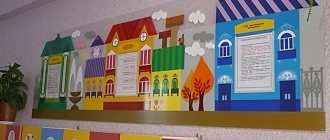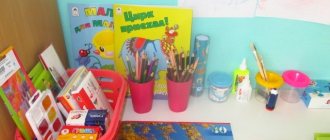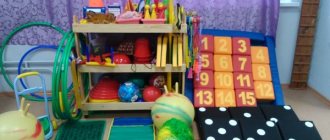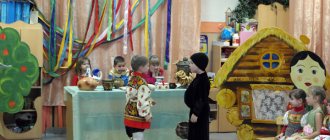Parents' corner according to FROGS in kindergarten: important design rules
Parent's corner according to FROGS in kindergarten: important design rules
Most people don’t even think about the fact that parent’s corners in kindergartens must be designed in accordance with some rules. But in fact, there is even a special passport that specifies the characteristics of the corner.
The passport contains the following information:
- Initially, the name of the parent’s corner is written in the passport, for example, the “Health” corner, the “First-Grader” corner.
- Next comes a description of the group - its number is indicated, as well as the exact age of the children who attend it.
- Further, the passport indicates the purpose for which the parent corner was created, for example, in order to tell parents what the children did today, or when the holiday matinee will be held.
- It also indicates what visual materials were used, as well as their quantity, for example, wall posters or special maps.
- If the corner has a thematic focus, for example, helping parents teach their children, then the passport contains a card index of games and exercises that are recommended to parents.
Parents' corner according to FROGS in kindergarten - important design rules:
- The parent's corner should satisfy not only the interests of parents, but also children, according to their age. This means that while mom or dad is studying information, the baby should also be busy with something. For example, even looking at funny pictures.
- Visual aids and materials also need to be selected taking into account the age of the children in the kindergarten group. So, in the nursery group there is no need to place stands with the alphabet. This age category is currently only interested in bright pictures.
- The parent's corner should look as aesthetically pleasing as possible. It is best to use bright colors and more beautiful fonts for headers and titles.
- The corner should be located in the most convenient place. It should be well lit, otherwise it will be difficult for parents to read the information that is written in small print. If it is not possible to place the stand in the brightest part of the room, you need to consider an additional light source.
- In the parent's corner of the kindergarten there must be information that takes into account regional characteristics - life, crafts, types of art, language.
The importance of individual consultations for parents and the specifics of their implementation
Maria Moskina
The importance of individual consultations for parents and the specifics of their implementation
The Federal State Educational Standard for Education says that an individual approach is necessary not only when working with children, but also when working with parents . The teacher, when communicating with parents , must feel the situation, the mood of mom or dad. This is where the teacher’s human and pedagogical ability to reassure the parent , sympathize and think together about how to help the child in a given situation comes in handy.
One of the forms of work that helps to implement an individual approach both in working with a child and his family is individual counseling . Part of the consultation is devoted to children's learning difficulties. Individual consultations are close to conversations , their main difference is that the latter involve dialogue, which is led by the organizer of the conversations. The teacher strives to give parents qualified advice and teach something. This form helps to get to know the life of a family more closely and provide help where it is needed most; it encourages parents to take a serious look at their children and think about how to more effectively teach and raise their children.
Individual consultation helps parents and teachers make the overall correct solution to a particular problem that has arisen so as not to harm the child.
For many parents, individual consultation helps them open up . Parents , listening to the teacher, begin to understand the problematic situation as it really looks, and not as they see it from their side.
Preparing for consultation :
- outline a topic, plan;
— prepare content, visibility;
- think about the place and time;
- invite the parent ;
— formulate recommendations.
When preparing for a consultation , it is advisable to identify a number of questions, the answers to which will help plan educational work with the group. Individual consultation should be informational in nature and contribute to the creation of good contact between parents and teacher . The teacher must give parents the opportunity to tell him everything that they would like to introduce the teacher to in an informal setting, and find out important information for their professional work with the child: the child’s health characteristics , his hobbies, interests, preferences in communication in the family, behavioral reactions, character traits , learning motivations, family moral values.
Contents of the consultation .
The consultation can be organized in the form of a conversation, discussion of a problem, an article (read in advance, questions and answers. The content of the consultation consists of an introduction, the main part and a conclusion. The content is specified in detail.
Requirements for consultation .
-Consultation is carried out in the evening and in the absence of the child.
-The consultation is carried out without haste and in a friendly manner.
-It is important to win over the parent .
-The consultation is initiated by the preschool educational institution , but can be carried out at the request of the parent .
When inviting parents for an individual consultation, you need to behave correctly. Always smile. A smile is a small key to positive emotions and easy communication. Be sure to address your parents by name and patronymic. Always know how to listen and hear, listen without interrupting. Look at the problem that has arisen through the eyes of the parents , and not just with your own eyes, then you can see which side is better to approach this problem, how to correctly present its solution without damage to the child and his parents .
Emotions play a big role in . Parents may be constrained, or, on the contrary, impulsive. The teacher must find a special approach for an individual consultation to take place . It is necessary to choose the intonation of your voice, be attentive, and polite. When talking, look at your parents and not to the side. The relationship must be trusting. Under these conditions, individual consultation brings great benefits when working with parents .
Thus, we came to the following conclusion: working with parents is a complex and important part of a teacher’s activity. Individual consultations are a form of teacher work with parents of preschool children. The purpose of the consultations is to increase the pedagogical literacy of parents on the issues of raising and educating the child, solving problematic issues, enhancing the pedagogical skills of parents , helping parents in resolving difficult pedagogical situations, informing about the successes and achievements of the child. Emotions play a big role in . Therefore, the teacher must be able to find a special approach to each parent in order for an individual consultation to take place .
Materials for the parent's corner in the preschool educational institution - information in the parent's corner
Materials for the parent's corner in a preschool educational institution - information in the parent's corner
And now, let's figure out what information can be placed in the parent's corner. Remember that it should be presented as positively, clearly and, if possible, in not very large volumes. It is unlikely that parents will stand near the stand for a long period of time; they should see a short and informative message in front of them. It is also important to take into account that when placing printed information on a stand, it is necessary to indicate the authorship, date of publication of the material, and, if available, a link to the website, so that you can familiarize yourself with the material in full.
Materials for the parent corner in the preschool educational institution - information in the parent corner:
- Materials about the physical development of children
- Materials about the mental development of children
- Materials about aesthetic education
- Materials about developmental features
- Materials about health, ways to improve your health
- Materials about self-care skills
- Materials about planned classes
- Materials about children's literature
- Materials about music and musical works
- Materials about teaching methods for preschoolers
- Materials about the seasons
- Materials on speech development
- Advice from psychologists, speech therapists, pediatricians
- Thematic materials - New Year, March 8, Easter, February 23
Package of consultations for parents of children of primary preschool age
“Age characteristics of three-year-old children”
Time flies and your baby is already three years old. He has noticeably matured and wiser, and it is easier to agree on anything with him. Now a rather important period is coming for him - his personality is beginning to form. Therefore, it is very important not to miss this moment and lay a solid foundation for this.
Psychological characteristics of children 3 years old
At this age, children’s consciousness changes somewhat, and they begin
to perceive themselves as an independent person
. In this regard, parents may encounter some difficulties and sometimes even problems.
Children have a desire to independently manage their lives. At the same time, they find themselves in a very difficult situation, since on the one hand, children strive to do everything themselves, rejecting the help of loved ones, and on the other hand, they continue to reach out to their parents, realizing that they cannot do without their care. This may cause unbalanced behavior
, protests, stubbornness, hysterics and even outbursts of aggression.
During this period, it is important for adults to treat their child with respect, to make him realize the value of his own opinion, tastes and interests. It is necessary to support his desire for self-realization and provide the child with the opportunity to express his individuality, because he already clearly understands all his desires and aspirations.
Also, the psychological characteristics of a 3-year-old child are indefatigable curiosity and activity.
. He increasingly asks questions “why?” and “why?”, the baby is interested in absolutely everything, because before that he was just getting acquainted with the world around him, but now he wants to understand it. The level of development of a 3-year-old child is determined by how early he begins to ask such questions - the earlier, the more complete mental development. It is very important for parents to support their child’s curiosity and help him explore the world.
The age of three is the best period for children to develop through games such as modeling, drawing and designing. This will have a beneficial effect on the formation of memory, perception, speech, perseverance and thinking.
Children of this age become more susceptible to criticism
, blame and comparisons with others. Support and evaluation of their activities are very important for them; this has a significant impact on the further formation of self-esteem. Parents need to teach their child to overcome difficulties, helping him achieve positive results.
Emotional development of a 3 year old child
At this age, the baby begins to be happy if he manages to do something and get upset if he doesn’t go out. He shows pride both in himself and in his loved ones, for example, “my dad is the bravest,” “I am the best jumper,” etc.
Beautiful and ugly things evoke different emotions in him, he notes the difference between them and evaluates them. He also notices the joy, dissatisfaction, and sadness of those around him. Can empathize
to various characters when watching cartoons or listening to fairy tales: getting angry, sad, happy, etc.
The baby may feel ashamed or upset
. He knows when he has done something wrong, worries when he is scolded, and can be offended for a long time by punishment. Understands if someone else is doing something bad and gives it a negative assessment. The child may also show feelings of jealousy or stand up for others.
Speech development of a 3-year-old child
Usually, at this age, kids already speak quite well.
, can speak out and understand what is wanted from them. If speech can develop differently in two-year-old children, and there are no specific requirements for it, then a normally developed three-year-old child should have some skills.
Speech characteristics of 3 year old children:
- The child should be able to name animals, clothes, household items, plants, equipment, etc. from pictures.
- You must say “I” about yourself, and also use pronouns: “mine”, “we”, “you”.
- Must be able to speak in simple phrases of three to five words. Start combining two simple phrases into a complex sentence, for example, “when mom finishes cleaning, we will go for a walk.”
- Enter into dialogues with adults and children.
- Must be able to talk about what he did recently and what he is doing now, i.e. conduct a conversation consisting of several sentences.
- Must be able to answer questions based on the plot picture.
- Must answer what his name is, give his last name and age.
- Outsiders must understand his speech.
Physical development of a 3 year old child
Due to accelerated growth, body proportions change
, children become slimmer, their posture and the shape of their legs change noticeably. On average, the height of three-year-old children is 90-100 centimeters and their weight is 13-16 kilograms.
At this age, the child can perform and combine various actions
. He can jump over a line, step over an obstacle, jump from a small height, stand on his toes for several seconds, and climb stairs on his own. Also, the baby must be able to eat with a fork and spoon, put on shoes, dress, undress, fasten and unfasten buttons. The level of development of a 3-year-old child should allow him to independently regulate physical needs - go to the toilet in a timely manner, while sitting down, undressing and dressing.
“The role of didactic games in family and kindergarten”
Didactic games are one of the means of educating and teaching preschool children.
In play, the child develops physically and learns to overcome difficulties. He develops intelligence, resourcefulness, and initiative.
The “Kindergarten Education Program” places great demands on didactic games. It says: “With the help of didactic games, the teacher carries out sensory education of children, develops cognitive processes (curiosity, understanding of the relationship between simple phenomena, etc.). He uses the game as a means of developing thinking, speech, imagination, memory, expanding and consolidating ideas about the life around him.”
In the theory and practice of preschool education, there is the following classification of didactic games:
a) with toys and objects;
b) so-printed;
c) verbal.
New games need to be introduced gradually. They must be accessible to children and at the same time require a certain amount of effort, contribute to their development and self-organization.
The characteristic features of didactic games are that they are created by adults for the purpose of teaching and raising children. However, created for didactic purposes, they remain games. The child in these games is attracted, first of all, by the game situation, and while playing, he quietly solves a didactic problem.
Each didactic game includes several elements, namely: a didactic task, content, rules and game actions. The main element of a didactic game is a didactic task. It is closely related to the lesson program. All other elements are subordinate to this task and ensure its implementation.
Didactic tasks are varied. This can be familiarization with the environment (nature, flora and fauna, people, their way of life, work, events in social life), speech development (consolidating correct sound pronunciation, enriching vocabulary, developing coherent speech and thinking). Didactic tasks may be associated with the consolidation of elementary mathematical concepts.
The content of didactic games is the surrounding reality (nature, people, their relationships, everyday life, work, events in social life, etc.).
A big role in the didactic game belongs to the rules. They determine what and how each child should do in the game, and indicate the path to achieving the goal. Rules help develop children's inhibition abilities (especially in early preschool age). They teach children the ability to restrain themselves and control their behavior.
Children of primary preschool age find it very difficult to take turns. Everyone wants to be the first to take a toy out of the “wonderful bag”, get a card, name an object, etc. But the desire to play and play in a group of children gradually leads them to the ability to inhibit this feeling, that is, to obey the rules of the game.
Thanks to the presence of game actions, didactic games used in the classroom make learning more entertaining, emotional, help increase children's voluntary attention, and create the prerequisites for a deeper mastery of knowledge, skills and abilities.
Didactic games contribute to the formation of mental qualities in children: attention, memory, observation, and intelligence. They teach children to apply existing knowledge in various play conditions, activate a variety of mental processes and bring emotional joy to children.
Play is indispensable as a means of developing correct relationships between children. In it, the child shows a sensitive attitude towards a friend, learns to be fair, to give in if necessary, to help in trouble, etc. Therefore, the game is an excellent means of fostering collectivism.
Didactic games also contribute to artistic education - improvement of movements, expressiveness of speech, development of creative imagination, bright, heartfelt portrayal of an image.
Children of all age groups play with dolls. Games such as “Treating a doll”, “Bathing a doll”, “Walking with a doll”, “Putting a doll to sleep” and others are used mainly to consolidate, clarify and expand everyday vocabulary and develop coherent speech, and least of all attention is paid to using these games for educational purposes. The doll is the favorite toy of children. They treat her the way a mother treats her child. This forms in children such positive qualities as caring for the doll, tenderness, affection, attention, and the desire to see the doll always clean, neat, and combed. If adults instill these qualities during play, the child will not throw the doll on the floor or drag it by the leg. The positive moral qualities formed will gradually be transferred to the relationships of the children themselves.
Many didactic games lead children to generalization and classification, to the use of words denoting general concepts (tea, tableware, kitchen utensils, furniture, clothing, shoes, food).
Didactic games are an indispensable means of teaching children to overcome various difficulties in their mental and moral activities. These games contain great opportunities and educational effects on preschool children.
“Physical education - hurray!”
Many parents whose children are often sick for a long time believe that a child who is in poor health should not be burdened with physical exercise. This opinion is wrong: there are no contraindications for physical education. Nowadays many different sets of physical exercises have been developed. The main thing is to choose the physical activity that each child needs. The simplest selection criterion is the child’s well-being and mood during and after classes. It is also very important to follow the principle of gradualness so that physical activity improves the functioning of all vital organs.
Systematic classes and physical exercises that are feasible for the baby will certainly strengthen his health, make him strong, dexterous, and resilient. How can parents organize their child’s health through physical education? These remedies have long been known: morning exercises, jogging, swimming, cycling, hiking and excursions, in winter - skiing, skating. You just need to use these means not occasionally, but constantly, so that they become part of your family routine, become necessary and familiar to you and your child.
Teach your child the skills of self-monitoring of their own health. For example, he must be able to check and monitor his posture. You, of course, know this trick. Stand with your back to the wall, pressing your heels, buttocks, shoulder blades and head tightly against it. Fix this position and, moving away from the wall, remember. With repeated repetition, muscle “memory” is developed. Adults must reinforce the skill of controlling posture by their own example - they themselves must sit correctly, walk, hold their back, and do exercises that strengthen their muscles.
Domestic doctor and teacher E.A. Arkin pointed out: “Both the physical position of our body and the mental attitude in relation to the world around us are entirely a matter of education, the result of those examples and models that the child sees and hears from his parents.” Let your baby be healthy and happy!
Consultations with parents of preschool children
Compiled by:
Guselnikova O.A.
"Speech of a little preschooler"
The development of a child’s intelligence is a multifaceted and complex process. In it, perception, attention, memory, thinking, and speech go hand in hand. And which of the listed components of intellectual development is the primary and most important is impossible to determine. They all walk side by side, relying on each other in development, from time to time losing primacy to each other.
Speech. Any human activity requires not only his understanding of the words of his native language, but also their use in speech (education of sound culture of speech, expansion and activation of vocabulary); you need to be able to put words - “building blocks” into sentences: change them by cases, numbers, genders, etc. (development of the grammatical structure of speech, you need to be able to ask, answer, tell (development of coherent speech).
And, if all components of intelligence are so important, then at what age should they be developed?
According to modern psychologists, speech therapists, and teachers, at the age of 3-5 years, the intensive formation and development of skills and abilities begins that contribute to children’s study of the external environment, analysis of the properties of objects and phenomena; At this age, the child’s “feeling” for language is also especially pronounced.
The time at which the prerequisites for the formation of a particular function arise is individual for each child, although it is approximately determined by age. Therefore, in order not to miss the most successful period for starting developmental education, it is more advisable to start it from the age of 3: this will also be useful for those children who have the prerequisites for mastering various developmental tasks and topics, the pace of development of which is individual and lags behind average age norm.
Tips for parents:
How to work with a child?
— Dear adults, remember that your tasks should not be evaluative, but educational and developmental in nature.
— The main thing when working is not the amount of knowledge a child has mastered, but the development of his desire to learn.
- A child will study successfully if he wants to study, and does not study because he is forced. Your task is to turn your requirements into the child's desires.
- Never compare your child with other children, celebrate only his own successes and achievements.
- It should be remembered that the duration of one lesson should not exceed 15-20 minutes. If your child attends kindergarten, then one lesson per day is enough. If the child does not attend kindergarten, then two such classes can be held per day with an interval of at least 15 minutes.
— For each lesson, tasks should be selected, both verbally and on worksheets.
— It is advisable to complete tasks on worksheets in pencil (except for those where work with color is provided). This will give you the opportunity to invite your child to repeat the task if the initial solution is unsuccessful.
— For one lesson, try to select exercises in different directions, for example, exercises for developing attention, coherent speech, and developing vocabulary.
— At the beginning of the lesson, to ensure a positive attitude, it is better to offer the types of exercises that the child has mastered during work in previous lessons.
— Don’t forget to repeat those tasks that caused difficulties for your child.
— When helping your child with any tasks, do not complete the task for him: it is better to ask a leading question, offer 2-3 answer options, and return to tasks of the same type completed earlier.
— If your child can’t cope with the task, don’t worry: put off the task until the next lesson and think about why the child couldn’t cope with the task.
"Daily regime. Is this important or not?
There is no greater joy for parents than to see their child healthy and seasoned.
In order for a child to grow up healthy, balanced, physically strong, have a good appetite and good sleep, one must strictly adhere to the regime. It is the most important condition for proper education. A routine is a rational and clear alternation of sleep, food, rest, and various types of activities during the day. Sleep, food, walks, direct educational activities - all this should be carried out in a certain sequence. A rhythmic routine contributes to the normal development of the child’s body.
Why is the regime so important? All life processes in the body proceed in a certain rhythm. The heart works rhythmically - contraction is followed by relaxation; breathing is rhythmic, when inhalation and exhalation alternate evenly; food in the digestive tract is processed within a certain time frame.
All phenomena in nature also proceed in rhythm: the change of seasons, day and night. Scientists have found that a life ordered by a regime ensures the normal course of life processes.
A correct regimen that corresponds to the child’s age-related capabilities improves health, ensures efficiency, successful implementation of various activities, and protects against overwork.
If a child eats, sleeps, rests, walks, and exercises whenever he pleases, then he will soon lose his appetite, sleep becomes restless, the child develops poorly, whims and stubbornness appear. He is less disciplined and obedient.
One of the essential components of the daily routine is a walk. This is the most effective type of rest; it well restores the functional resources of the body, reduced during activity, and, first of all, performance. Staying in the air helps to increase the body's resistance, hardens it, and improves health. Staying in the fresh air has a positive effect on metabolism, especially the protein component of food, and the absorption of nutrients. After a walk, the child’s sleep and appetite always return to normal. A walk gives children the opportunity to satisfy their movement needs through outdoor games, work activities, and various physical exercises. The walk should be carried out in any weather, with the exception of particularly unfavorable weather conditions.
A child’s behavior in kindergarten, his mood, and performance are directly dependent on how his activities and sleep are organized in the family on regular days and also on weekends.
Children spend their days off at home, as a rule, with significant deviations and even disruptions to their usual routine. It is no coincidence that the functional level of children on Monday is worse than on the second or third day of the week. Therefore, the child’s home regime on those days when he does not attend kindergarten should not differ from the preschool regime.
Summing up, I would like to say that an orderly home routine, daily evening walks, a full night's sleep for the child, and on weekends good rest in the fresh air, regulation of watching television (especially before bed) will contribute to the normal growth and development of the child, his physical and mental well-being. Remember this!
"The role of the family in raising children"
Raising the younger generation in a democratic society is a matter of particular concern. Its success is determined by the unity and consistency of the educational influences of public education carried out in state educational institutions, the family and the public. The basis of this unity is the complete coincidence of the interests of the state and the family in educating the new generation, which consists in the formation of comprehensively and harmoniously developed citizens, useful to society, and devoted to the Motherland.
The unity of public and family education is one of the main principles of the social education system, which is recorded in the most important government documents. The educational influence of the family on children should be more and more organically combined with their social upbringing.
The leading role of public education is due to the fact that a child is raised in a group of peers, where he acquires the first skills of social behavior; it is scientifically based, takes place in a specially created pedagogical environment and is carried out by professionally trained specialists.
Recognition of the leading role of public education does not detract from the enormous importance of the family in the formation of a child’s personality.
The family is the primary unit of society in which a new person appears; this small social group is the first school of life for a child. Parents are his first teachers and educators. The power of their influence on the developing personality is exceptionally great. The basis of parents’ influence on a child is their unselfish love for him, care for him, combined with exactingness. The child responds to this love and care with a feeling of deep affection and love for his parents, recognition of their superiority and authority, and the desire to follow them and imitate them in everything. The strength of the family's influence is determined by the child's compliance with educational influences and his imitation.
Our state evaluates the educational role of parents as their important social and civic duty.
“Citizens of Russia,” the Constitution says, “are obliged to take care of the upbringing of their children, prepare them for socially useful work, and raise them to be worthy members of society. Children are obliged to take care of their parents and provide them with assistance.”
The importance of the family in raising young children is especially great; under the guidance of their parents, they acquire basic ideas about the world around them.
Russian families have accumulated positive experience in successfully raising children in accordance with the requirements of society: instilling in them love for the Motherland and the foundations of moral behavior. But there are families in which serious mistakes are made in raising children, which negatively affects their further development and poses a complex problem of re-education. The main reason for these mistakes is the insufficient level of pedagogical culture of parents.
Wanting to raise your child to be a good person, a future citizen, is not enough. You have to be able to do this.
Who should help parents master the science and art of education? An important role in this work belongs to teachers of preschool institutions. In an effort to establish unity and interaction of educational influences on the child in the family and kindergarten, they carry out pedagogical education of parents, provide them with practical assistance, educators do a lot of work with the family, achieving the unity of public and family education.
Conditions for proper upbringing of children in the family
Parents must understand the thought of A. S. Makarenko that “raising children is the most important area of our lives... Proper upbringing is our happy old age, bad upbringing is our future grief, these are our tears, this is our guilt before other people, in front of the whole country." Raising your child should not be viewed as a personal matter, but as the fulfillment of a civic duty to society. By raising children, parents shape the personality of future workers, citizens, future fathers and mothers; Not only they themselves, but society as a whole are interested in success. In exceptional cases, when parents cannot create the necessary conditions for raising their children, the state provides them with assistance.
Raising children in a family can be successful only when parents clearly understand its purpose and objectives, ways and means of their implementation. This is necessary to establish the unity of educational influences in the family and kindergarten. “We must be clear about our own parental desires,” said A. S. Makarenko. He emphasized that parents must clearly understand who they want to raise from their child, what kind of person, what qualities to endow him with. To raise a child correctly, you need to know and understand him well, and this requires pedagogical knowledge. They will help parents in correctly analyzing their child’s behavior and choosing the right ways to raise him.
An important role in raising children is played by the general way of life of the family: equality of spouses, organization of family life, correct relationships between family members, a general tone of goodwill, mutual respect and care, an atmosphere of patriotism, hard work, general order and family traditions, unity of adults’ demands for the child. Family life should be organized in such a way that not only material needs (food, clothing, warmth, etc.), but also spiritual needs are more fully satisfied and developed.
Parents must have authority in the eyes of the child; without this, education is impossible. What is parental authority based on? The basis of parental authority is the civil face of the parents, their life, work, behavior, and sense of responsibility for their family before society. The most authoritative parents are those who successfully combine work and social activities with family responsibilities, show interest and attention to the lives of their children, skillfully and tactfully guide their lives and development - all this applies equally to both mother and father.
The basis of the parent's attitude towards the child is a natural and wonderful feeling of love for him. “Love is the creator of everything good, sublime, strong, warm and bright,” wrote F. E. Dzerzhinsky. It's all about feeling the extent of manifestation of parental love, combining it with exactingness and respect for the child's personality. Immense love for a child, manifested in the unconditional satisfaction of all his desires and demands “I want”, “Give”, “Buy”, open admiration of him, demonstration of his barely visible abilities - all this harms the baby, makes him capricious, selfish, weakens his will . Such love for a child is called blind.
The correct attitude of parents towards children lies in the ability to combine affection, softness, and tenderness with strict consistent demands, taking into account the child’s capabilities and age characteristics. A. S. Makarenko advised parents “to be as affectionate as you like with the child, joke with him, play, but when the need arises, you must be able to give orders briefly, once...”. Consequently, the tone of the relationship between parents and children should combine calmness, balance, friendliness with determination and efficiency. Treating a child correctly means respecting him as a person, even if he is still small, with little life experience and knowledge, respecting his rights to the attention of adults, to communicate with them, to conditions for a variety of activities.
Parents' corner for a nursery group in a kindergarten
Parents' corner of the nursery group in kindergarten:
- In the parent's corner of the nursery group of a kindergarten there must be information on how to adapt a child to kindergarten.
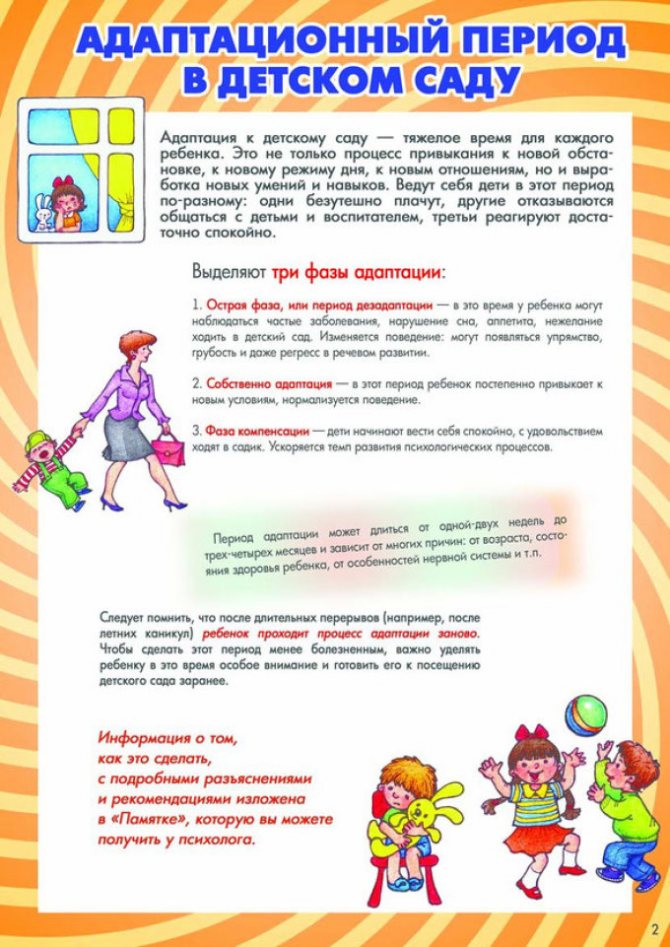
Parents' corner for a nursery group in a kindergarten

To defuse the situation, humorous rules for parents can be placed in the parent's corner.
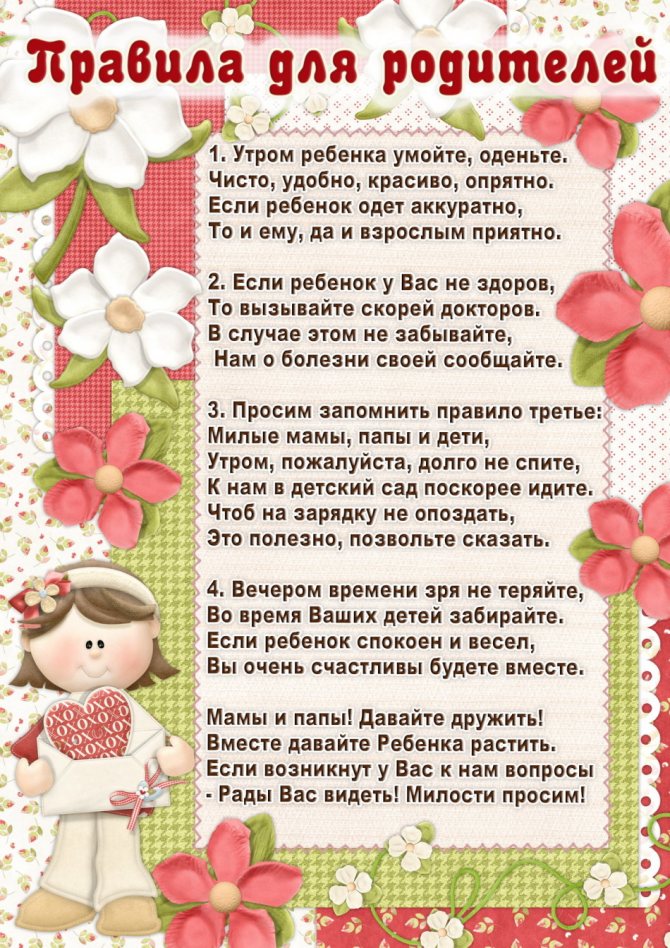
Parents' corner for a nursery group in a kindergarten
We must also remember that this age category of children is very strongly attached to their parents; they simply cannot imagine their existence without them. To make the morning separation ritual as comfortable as possible, teach your parents how to do it correctly.
Parents' corner for a nursery group in a kindergarten
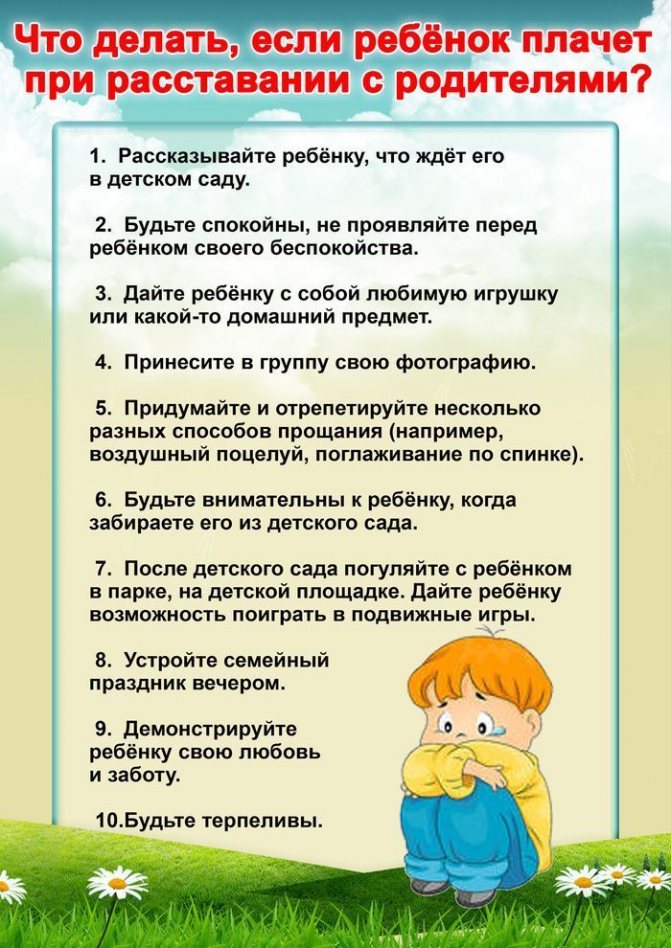
Parents' corner for a nursery group in a kindergarten

Parents' corner for a nursery group in a kindergarten
It is also important to explain to parents what they cannot bring to kindergarten. This way you can avoid the occurrence of not very pleasant situations.

Parents' corner for a nursery group in a kindergarten
Be sure to place material on the physical characteristics of young children at the orientation booth. It is important that parents understand in time that the baby is tired and it’s time for him to rest. The psycho-emotional and physical health of the baby depends on this.
Parents' corner for a nursery group in a kindergarten Parents' corner for a nursery group in a kindergarten
And of course, don’t forget about entertainment for the kids. Advise parents on how to entertain their child.
Parents' corner for a nursery group in a kindergarten
Fifteen tips for parents of preschoolers
Preschoolers are distinguished by their irrepressible energy and curiosity. And this keeps their parents in constant tension. During this period, children learn a lot and acquire many new skills. This sounds great, but parents of preschoolers know how difficult it is to cope with children who cannot sit in one place for even a minute.
Let's look at some tips for parents of preschoolers.
1. Help your child develop communication skills
Communication skills are no less important for preschoolers than for older children. The better a child's communication skills are developed, the better he will be able to get along with peers and teachers in kindergarten.
2. Teach your child to listen
We all know well how difficult it can be to concentrate a child’s attention on anything. However, in kindergarten he will have to take part in various activities: singing, drawing, listening to the teacher’s explanations, etc. All this will require perseverance and attention from the child. Listening skills will help your child take an active part in various activities in kindergarten.
3. Teach your child to work in a team
When a child goes to kindergarten, he spends only a few hours a day at home, and the rest of the time he is close to his peers and teachers. Kindergarten classes require teamwork from the child. This skill can be developed in your child at home through various games.
4. Teach your child to follow directions.
At an early age, we learn new things by following instructions and directions. However, it will be difficult for a child to learn something if he does not know how to follow directions. In kindergarten, the child receives instructions from the teacher and thus develops new skills. Teach your child to follow instructions by playing games with him. Give your child fun tasks and take part in games with him.
5. Teach your child how to use stationery
In kindergarten, your child learns to work with pencils, crayons, scissors, markers, etc. Draw with your child at home to teach him how to use these items. Also teach your child to write letters and numbers.
6. Encourage your child to be independent
At home, you help your child wash his hands before and after eating, brush his teeth, tie his shoelaces, etc. But when your child goes to kindergarten, you cannot be with him all the time. Encourage him to be independent: teach him to wash his hands, wash himself, etc. This instills in the child a sense of responsibility and independence. This will definitely come in handy in the near future.
7. Establish daily routine for your child
A child needs a daily routine. Giving your child time during the day to play, eat, sleep, etc. benefits both of you. A consistent daily routine not only teaches your child discipline, but also helps you manage your time effectively. Once your child gets used to the routine, you won't have to constantly remind him to go to bed or sit down to eat.
8. Don't be too strict with your child
Do not confuse discipline with rigor. If you are too strict with your child, he may become stubborn. Speak to your child in a friendly manner, establish a trusting relationship with him so that he can communicate with you without feeling afraid. It will also help you establish a strong emotional connection with your child.
9. Don't give in to your child's tantrums
You shouldn’t be strict with your child, but you shouldn’t be too soft with him either. Try to find a middle ground. Don't give in to your child's tantrums, but don't ignore them either. If your child is throwing a tantrum because he didn't get something, offer him something in return. Try to determine the cause of the hysteria. Perhaps the child is simply hungry or tired.
10. Don't treat your child like an adult.
Many parents expect too much from their children. Understand that the child still does not know and cannot do much. Don't expect your child to immediately understand everything you tell him. Be patient and allow your child to learn at his own pace. Encourage your child to study and praise him for his efforts. When you give your child tasks, be creative. Make sure your child sees this as a fun activity and not a boring chore.
11. Don’t refuse all your child’s requests.
It may be difficult, but it is possible. Try not to say “no” to your child too often. Young children are very sensitive, and your frequent refusals may make him feel unloved. In addition, refusals can lead to disobedience in the child. Talk to your child in a language they understand and explain your position to them instead of just saying “no.”
12. Praise your child for good behavior
Don't forget to praise your child for good work. This will encourage him to do a good job in the future. And vice versa: if a child has done something wrong, explain to him why it is wrong to do so. This will help the child realize what he is doing wrong and what consequences his actions will have.
13. Don't set your child's expectations too high.
Each child learns at his own individual pace. Of course, you have certain expectations about him. However, you must understand your child and accept his abilities. Don't set the bar too high for him - remember that he is still a child. Let him learn at his own pace.
14. Set a good example for your child
The child spends most of his time with you. And how you behave, what and how you do - all this affects its development. Set a good example for your child so that he can look up to you.
15. Create a strong emotional connection with your child
Raising a child can be a challenging task. But this is a stage of development, both for him and for you. It is important that you do interesting activities together and that you both enjoy it. Joint activities will help you create a strong emotional connection with your child. You should be not only parents for your child, but also friends on whom he can always rely.
Mistakes that parents make when communicating with preschoolers
Parents always want the best for their child. However, good intentions sometimes have the opposite effect and demotivate the child. Let's look at some tips to help parents avoid mistakes.
1. Don’t set a bad example for your child.
Little children imitate their parents in everything. You are an example for your children in almost everything. If you want to develop good habits in your child, start with yourself. You can't expect your child to eat healthy food if you yourself are eating chips and fast food. A good example will bring positive results in raising a child.
2. Don't agree with your child on everything.
Often parents adore their child so much that they cannot refuse him anything. However, you cannot indulge your child in everything. Don't let him manipulate you; when it comes time to say no, say it clearly. Explain to your child the reason for your refusal.
3. Don't overprotect your child.
Parents should protect their children, but overprotection prevents them from developing. If you overprotect your child, he begins to rely on you for everything. Let your preschooler do some things on his own. If a child falls while playing, you should not rush to his aid every time. Let it rise on its own.
4. Don't try to bribe your child
Parents often bribe their child with candy or other sweets to get them to do something. However, this does not solve the problem. For example, if you offer your child a piece of cake after he eats soup, he will not like soup. Moreover, the child is more likely to begin to hate soup.
5. Don’t compare your child with peers
Sometimes parents forget that every child is unique. If you have several children, do not compare them with each other. Comparisons can make a child feel unloved. The child may develop hatred towards brothers or sisters with whom he is compared.
Raising preschoolers is not an easy task. But it can be a fun activity. You will see how your child changes. Make sure you don't force your ideas on your child. Instead, find out what motivates your child and establish a friendly relationship with him.
Related links:
- Advice from experienced educators to parents
- Moral education of children: main stages and advice to parents
- How to criticize children: tips for parents
- The biggest mistakes parents make when talking to their children
- More articles dedicated to parents
Parents' corner for the younger group in kindergarten
Parents' corner for the younger group in kindergarten:
At this age, it is already possible to begin intensive training for children. You can start with the rules of behavior. Of course, the kindergarten teacher will introduce children to the rules of behavior in society, but it will not be superfluous if parents also help children to socialize in society correctly.
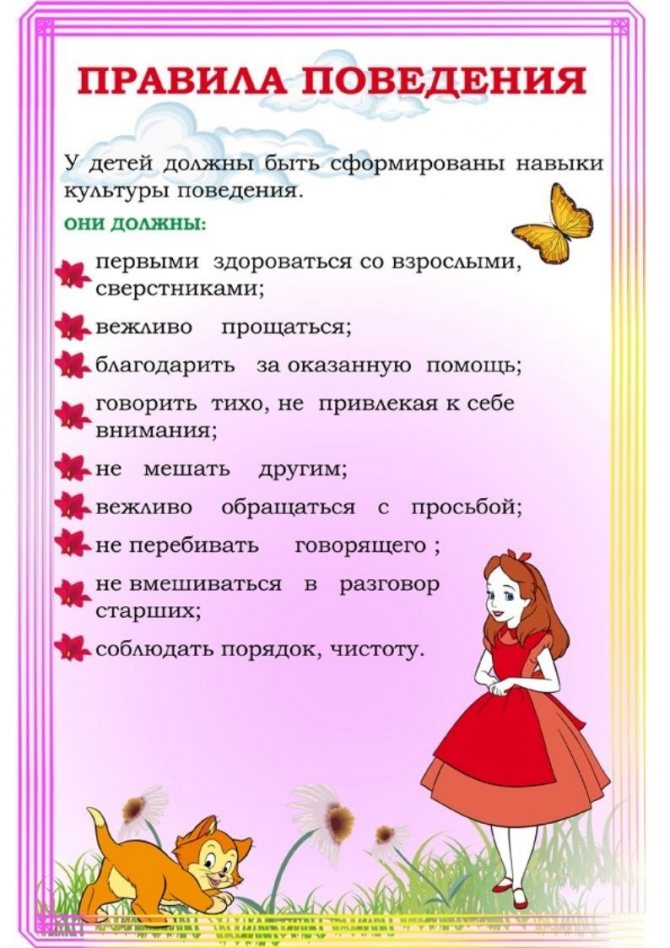
Parents' corner for the younger group in kindergarten
Don't forget to add information about your child's greed in the parent's corner. Parents must clearly understand that the baby is growing up as a little greedy person, and while there is an opportunity, help him learn to notice the needs of the people around him.

Parents' corner for the younger group in kindergarten
Help parents not make mistakes when raising their baby. After all, some people believe that shouting and punishment can teach something. As a result, the child moves away from his parents and stops trusting them.
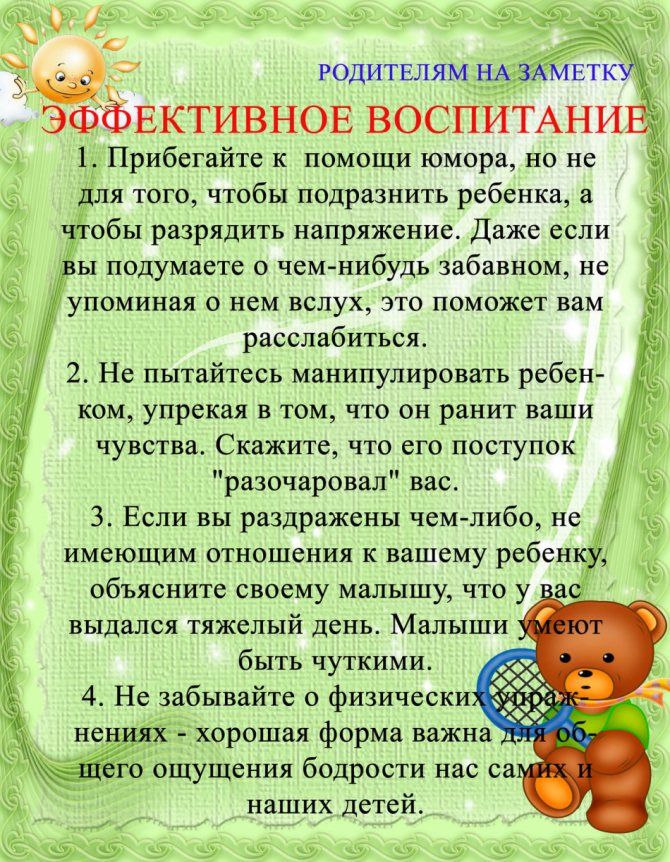
Parents' corner for the younger group in kindergarten
At this age, the child must understand that his things must be put in a certain place. Even if he doesn’t do it very carefully, he does it on his own.
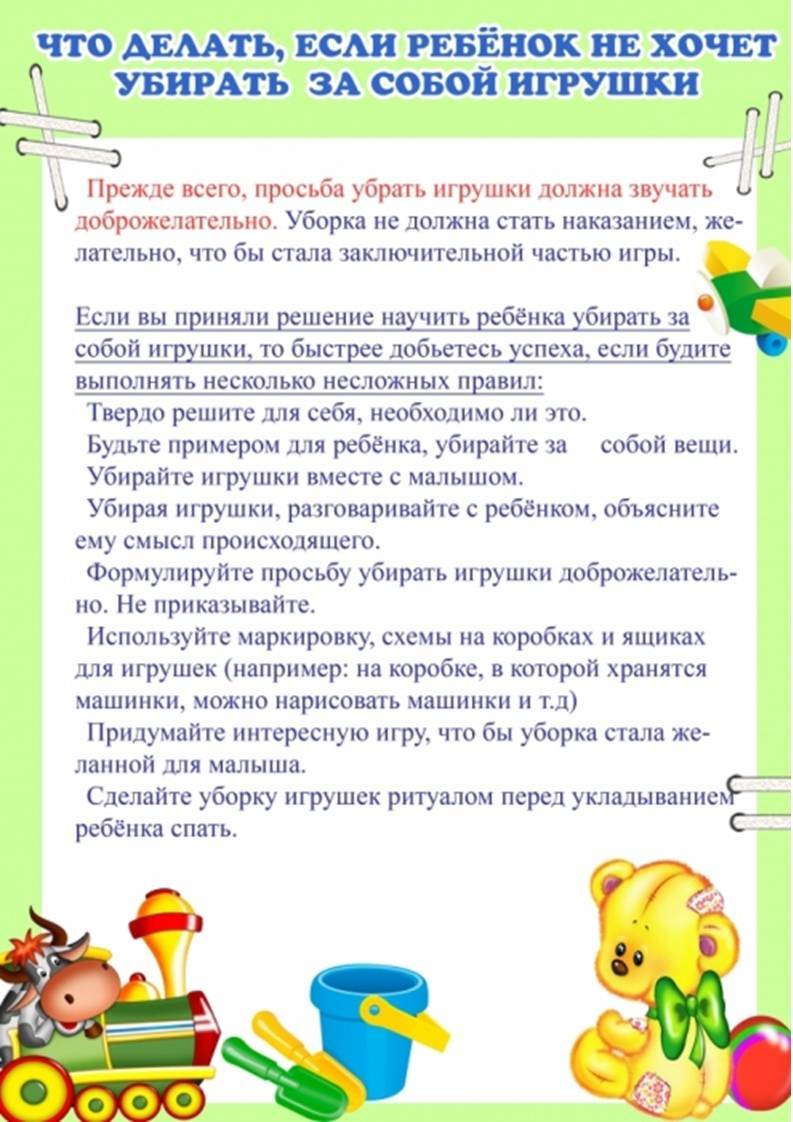
Parents' corner for the younger group in kindergarten
It is also important to teach parents to give their child some freedom. It is important that they understand that overprotection will cause many problems over time.

Parents' corner for the younger group in kindergarten
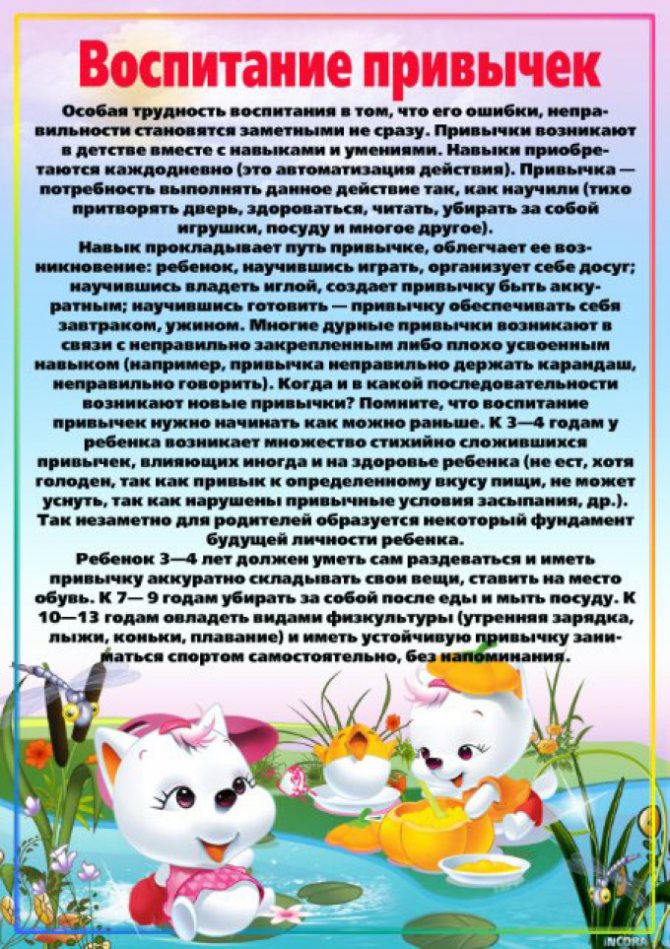
Parents' corner for the younger group in kindergarten
We also need to make sure that parents understand the importance of walking in the fresh air. After all, modern kids are literally familiar with Internet technologies from the cradle, and prefer watching cartoons instead of active pastime.

Parents' corner for the younger group in kindergarten
You can also use posters with information about proper dental care as educational material.
Parents' corner for the younger group in kindergarten
It is important to draw the attention of parents to the rules of nutrition so that the baby does not have health problems in the future.
Parents' corner for the younger group in kindergarten
There must be information in the parent's corner on how to properly develop a child's skills.
Parents' corner for the younger group in kindergarten
In the parent corner of the younger group there must be educational information about the danger that may await the little one.
Parents' corner for the younger group in kindergarten
PLAN FOR INDIVIDUAL CONSULTATION WITH PARENTS, TAKEN INTO ACCOUNT OF ACHIEVEMENTS AND DIFFICULTIES IN THE CHILD’S DEVELOPMENT
PLAN FOR INDIVIDUAL CONSULTATION WITH PARENTS, TAKEN INTO ACCOUNT OF ACHIEVEMENTS AND DIFFICULTIES IN THE CHILD’S DEVELOPMENT
in the junior group of the joint venture kindergarten "Kolosok" GBOU secondary school No. 1 "OTs"
With. Bolshaya Glushitsa
developed by a student of the correspondence department of SSPK group 3B
Kondratyeva Lyubov Vladimirovna
Topic of consultation:
"Stubbornness and whims"
Purpose of consultation:
to assist parents in resolving the problem of children's whims and their stubbornness.
Tasks:
1.
Identify the causes of whims and stubbornness.
2.
Introduce mother Olga Alexandrovna to the characteristics of capricious and stubborn children;
3.
Find practical recommendations for parents on how to overcome the problem of a child’s whims and stubbornness.
4.
Increase the competence of parents in raising a child.
Sample questions for parents:
1.Are there any other children in the family?
2.Are the behavioral patterns of children in the family the same?
3. In what situations do Ivan’s whims and stubbornness most often manifest themselves?
4.What methods of interaction were used in these situations?
5.How often does the child act up?
6.What is the cause of stubbornness and whims?
7. How do you react to your child’s whims and stubbornness? What you are doing?
Practical recommendations for parents:
The first of the researchers who studied the problem of stubbornness were A. I. Zakharov, L. S. Vygotsky, Elsa Koehler, L. V. Ostrovskoy, N. L. Kryazhevoy and many other domestic and foreign scientists. Zakharov A.I. in his work “Neuroses in Children” writes that stubbornness most often occurs at the age of 1.5 to 2.5-3 and sometimes at 5 years.
The outstanding Russian psychologist Leonid Semenovich Vygotsky described the following symptoms of this crisis:
1.Negativism
– the desire to do everything the other way around, contrary to requests or demands.
A child may insist that cheese is butter, blue is green, a lion is a dog. As soon as the adult agrees with him, the child’s “opinion” can suddenly change to the opposite.
2.Stubbornness
. The child insists on his own not because he really wants it, but because he demanded it (“I want”).
Moodiness is the other side of the same behavior disorder. He understands that it is impossible, but insists (“I don’t want to”).
3.Self-will
. He wants to do everything himself, refuses help where he still knows little (“I myself”).
I offer you recommendations for overcoming stubbornness and capriciousness in children:
I offer you recommendations for overcoming stubbornness and capriciousness in children:
1. Do not attach much importance to stubbornness and capriciousness. Take note of the attack, but don't worry too much about your child.
2. During an attack, stay close to him, let him feel that you understand him.
3. Do not try to instill anything in your child at this time - it is useless. Swearing makes no sense, spanking excites him even more.
4. Be persistent in your behavior with your child; if you say “no,” continue to remain with this opinion.
5. Don’t give up even when your child has a seizure in a public place. Most often, the only thing that helps is to take him by the hand and lead him away.
6. Hysteria and capriciousness require an audience, do not resort to the help of strangers:
“Look what a bad girl she is, ah-ah-ah!” This is all the child needs.
7. Try to cheat: “Oh, what an interesting toy (book, little thing) I have!”
Such distracting maneuvers will interest the capricious person and he will calm down.
8. Eliminate from your arsenal rude tone, harshness, and the desire to “break with the power of authority.”
9. Calm tone of communication, without irritability.
10. Concessions take place if they are pedagogically appropriate and justified by the logic of the educational process.
11. Do not praise a child if: it was not achieved through one’s own labor, is not subject to praise (beauty, strength, dexterity, intelligence), out of pity or a desire to please.
12. Praise the child: for an action, for an action accomplished; always begin to cooperate with a child with praise and approval; it is very important to praise the child in the morning, as early as possible and at night too; praise without praising (example: ask for help, advice, like an adult).
13. You cannot punish or scold a child: when the child is sick, unwell, or has recovered from an illness, since at this time the child’s psyche is vulnerable and the reaction is unpredictable; when the child eats, immediately after sleep and before bedtime; in all cases when something doesn’t work out (example: when you are in a hurry and the child cannot tie his shoelaces); after physical or mental trauma (example: a child fell, you scold him for it, believing that he is to blame); when the child could not cope with fear, inattention, mobility, etc., but tried very hard; when the internal motives of his action are not clear to you; when you're not yourself.
I suggest reading works of art to solve this problem.
For example,
the fairy tale “What kind of ears does mom have?”, author Tatyana Kholkina. The purpose of the fairy tale
: 1. To overcome the cry of a child.
2. Cultivate a caring attitude towards parents. Objectives of the fairy tale:
1. Using the example of the hero of the fairy tale, show that you cannot get what you demand by shouting. 2. A polite tone is the best solution to any problem.
Fairy tale “How Andryushka planted a seed” (T. Kholkina)
not only educational in its content, but also a good example of friendship and time spent in kindergarten.
The purpose of the fairy tale:
1. To encourage the child’s desire to attend kindergarten.
2. Respect for the environment .
Objectives of the fairy tale: 1. To introduce the kindergarten regime.
2. Show the importance of friendships. You can also watch educational cartoons with your child, for example: “ Queen Toothbrush”, “In the Forest”, “Mouse’s Song”
, etc.
To solve the problem of overcoming the child’s stubbornness and whims, you can also play games, not only at home or in kindergarten, but also on the way (to kindergarten, to the store, to the dacha or somewhere else) For example, the game “Why? » (from the collection “Games and Tales that Heal” by A. V. Rudenko)
:
Purpose of the game:
1. Distract the child's attention. 2. Expand the child’s horizons of knowledge.
Game objectives:
1. Get the child interested.
Game “Trap for Caprizuli”
, you can read it, but it’s better to dramatize it when a child has a “whim” in his ear.
Purpose of the game:
1. Help the child cope with his whims.
Game objectives:
1. Overcome the child’s stubborn behavior.
Reflection
So, we have discussed with you the problem of children's whims and stubbornness.
Please tell me what you will do if your child is capricious and stubborn: he doesn’t want to leave the store and demands a new toy? What recommendation would you apply in this situation?
I would be glad if I helped you understand the situation. Thank you for your active participation in the consultation. Let's discuss changes in the child's behavior at home and in kindergarten in a week. Goodbye.
1.4. PLAN FOR INDIVIDUAL CONSULTATION WITH PARENTS, TAKEN INTO ACCOUNT OF ACHIEVEMENTS AND DIFFICULTIES IN THE CHILD’S DEVELOPMENT
Topic of consultation:
"Stubbornness and whims"
Purpose of consultation:
to assist parents in resolving the problem of children's whims and their stubbornness.
Tasks:
1.
Identify the causes of whims and stubbornness.
2.
Introduce mother Olga Alexandrovna to the characteristics of capricious and stubborn children;
3.
Find practical recommendations for parents on how to overcome the problem of a child’s whims and stubbornness.
4.
Increase the competence of parents in raising a child.
Sample questions for parents:
1.Are there any other children in the family?
2.Are the behavioral patterns of children in the family the same?
3. In what situations do Ivan’s whims and stubbornness most often manifest themselves?
4.What methods of interaction were used in these situations?
5.How often does the child act up?
6.What is the cause of stubbornness and whims?
7. How do you react to your child’s whims and stubbornness? What you are doing?
Practical recommendations for parents:
The first of the researchers who studied the problem of stubbornness were A. I. Zakharov, L. S. Vygotsky, Elsa Koehler, L. V. Ostrovskoy, N. L. Kryazhevoy and many other domestic and foreign scientists. Zakharov A.I. in his work “Neuroses in Children” writes that stubbornness most often occurs at the age of 1.5 to 2.5-3 and sometimes at 5 years.
The outstanding Russian psychologist Leonid Semenovich Vygotsky described the following symptoms of this crisis:
1.Negativism
– the desire to do everything the other way around, contrary to requests or demands.
A child may insist that cheese is butter, blue is green, a lion is a dog. As soon as the adult agrees with him, the child’s “opinion” can suddenly change to the opposite.
2.Stubbornness
. The child insists on his own not because he really wants it, but because he demanded it (“I want”).
Moodiness is the other side of the same behavior disorder. He understands that it is impossible, but insists (“I don’t want to”).
3.Self-will
. He wants to do everything himself, refuses help where he still knows little (“I myself”).
I offer you recommendations for overcoming stubbornness and capriciousness in children:
I offer you recommendations for overcoming stubbornness and capriciousness in children:
1. Do not attach much importance to stubbornness and capriciousness. Take note of the attack, but don't worry too much about your child.
2. During an attack, stay close to him, let him feel that you understand him.
3. Do not try to instill anything in your child at this time - it is useless. Swearing makes no sense, spanking excites him even more.
4. Be persistent in your behavior with your child; if you say “no,” continue to remain with this opinion.
5. Don’t give up even when your child has a seizure in a public place. Most often, the only thing that helps is to take him by the hand and lead him away.
6. Hysteria and capriciousness require an audience, do not resort to the help of strangers:
“Look what a bad girl she is, ah-ah-ah!” This is all the child needs.
7. Try to cheat: “Oh, what an interesting toy (book, little thing) I have!”
Such distracting maneuvers will interest the capricious person and he will calm down.
8. Eliminate from your arsenal rude tone, harshness, and the desire to “break with the power of authority.”
9. Calm tone of communication, without irritability.
10. Concessions take place if they are pedagogically appropriate and justified by the logic of the educational process.
11. Do not praise a child if: it was not achieved through one’s own labor, is not subject to praise (beauty, strength, dexterity, intelligence), out of pity or a desire to please.
12. Praise the child: for an action, for an action accomplished; always begin to cooperate with a child with praise and approval; it is very important to praise the child in the morning, as early as possible and at night too; praise without praising (example: ask for help, advice, like an adult).
13. You cannot punish or scold a child: when the child is sick, unwell, or has recovered from an illness, since at this time the child’s psyche is vulnerable and the reaction is unpredictable; when the child eats, immediately after sleep and before bedtime; in all cases when something doesn’t work out (example: when you are in a hurry and the child cannot tie his shoelaces); after physical or mental trauma (example: a child fell, you scold him for it, believing that he is to blame); when the child could not cope with fear, inattention, mobility, etc., but tried very hard; when the internal motives of his action are not clear to you; when you're not yourself.
I suggest reading works of art to solve this problem.
For example,
the fairy tale “What kind of ears does mom have?”, author Tatyana Kholkina. The purpose of the fairy tale
: 1. To overcome the cry of a child.
2. Cultivate a caring attitude towards parents. Objectives of the fairy tale:
1. Using the example of the hero of the fairy tale, show that you cannot get what you demand by shouting. 2. A polite tone is the best solution to any problem.
Fairy tale “How Andryushka planted a seed” (T. Kholkina)
not only educational in its content, but also a good example of friendship and time spent in kindergarten.
The purpose of the fairy tale:
1. To encourage the child’s desire to attend kindergarten.
2. Respect for the environment .
Objectives of the fairy tale: 1. To introduce the kindergarten regime.
2. Show the importance of friendships. You can also watch educational cartoons with your child, for example: “ Queen Toothbrush”, “In the Forest”, “Mouse’s Song”
, etc.
To solve the problem of overcoming the child’s stubbornness and whims, you can also play games, not only at home or in kindergarten, but also on the way (to kindergarten, to the store, to the dacha or somewhere else) For example, the game “Why? » (from the collection “Games and Tales that Heal” by A. V. Rudenko)
:
Purpose of the game:
1. Distract the child's attention. 2. Expand the child’s horizons of knowledge.
Game objectives:
1. Get the child interested.
Game “Trap for Caprizuli”
, you can read it, but it’s better to dramatize it when a child has a “whim” in his ear.
Purpose of the game:
1. Help the child cope with his whims.
Game objectives:
1. Overcome the child’s stubborn behavior.
Reflection
So, we have discussed with you the problem of children's whims and stubbornness.
Please tell me what you will do if your child is capricious and stubborn: he doesn’t want to leave the store and demands a new toy? What recommendation would you apply in this situation?
I would be glad if I helped you understand the situation. Thank you for your active participation in the consultation. Let's discuss changes in the child's behavior at home and in kindergarten in a week. Goodbye.
Parents' corner in the garden for the middle group in kindergarten
Parents' corner in the garden for the middle group in kindergarten:
Be sure to place a special reminder in the parent’s corner about the advisability of punishing the child, because sometimes parents, as they say, “go too far,” and this behavior affects the emotional state of the baby.
Parents' corner in the garden for the middle group in kindergarten
Don't forget about the advice of a psychologist. Parents must clearly understand that the atmosphere in the family has a huge impact on the development of the baby and its socialization.
Parents' corner in the garden for the middle group in kindergarten
A reminder about how a child should behave at home will also not be superfluous. After all, the mother may go to the pharmacy or the store for a couple of minutes, and the child must clearly understand that at this time he cannot let strangers into the home.
Parents' corner in the garden for the middle group in kindergarten
A cheerful poster about a healthy lifestyle will appeal to both kids and parents.
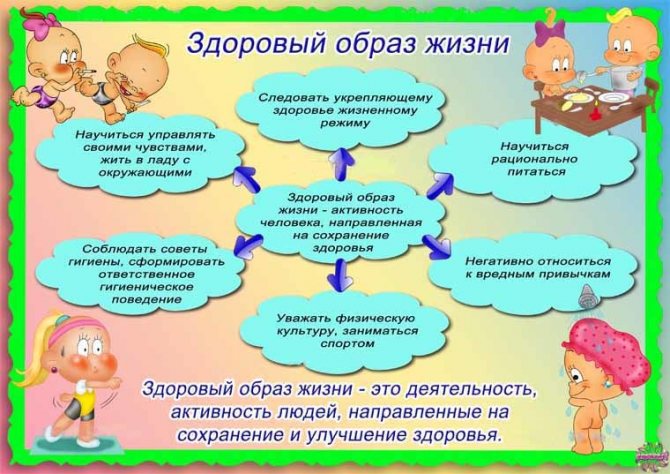
Parents' corner in the garden for the middle group in kindergarten
Some children, due to their shyness, find it difficult to make contact with unfamiliar people, and this can become a problem - the child will not have friends. Parents should understand that this is a bad situation and try to solve the problem in a timely manner.
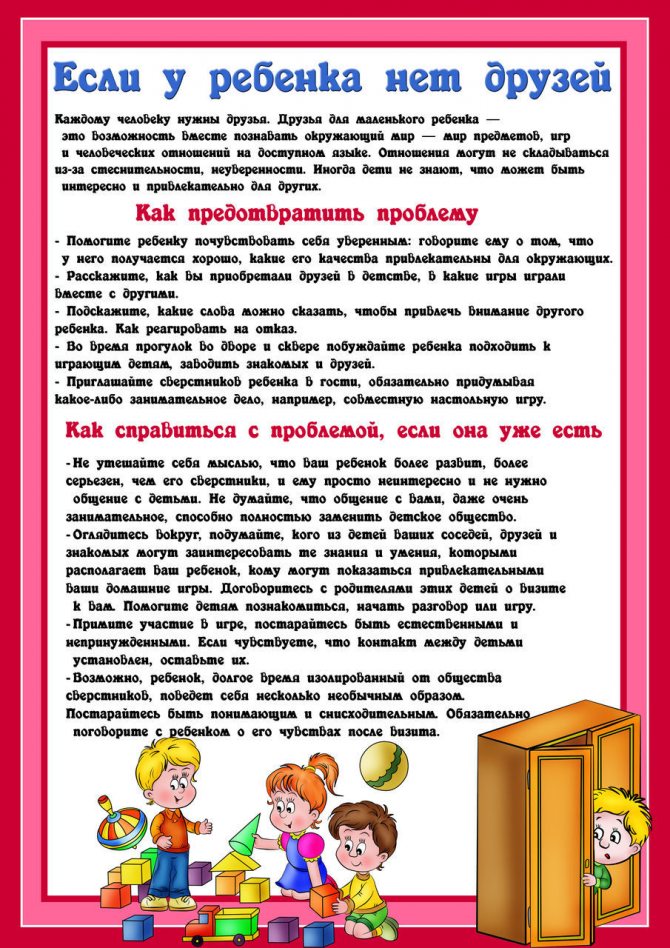
Parents' corner in the garden for the middle group in kindergarten
Each child is unique - some children are very calm, others live in their own imaginary world, and still others have many internal fears. Parents need to understand how to behave in different situations.
Parent's corner in the garden for the middle group in kindergarten Parent's corner in the garden for the middle group in kindergarten
Advice from a speech therapist will also not be superfluous. After all, before enrolling in school, the child should not have problems with speech.
Parent's corner in the garden for the middle group in kindergarten Parent's corner in the garden for the middle group in kindergarten
Senior group. Senior preschool age. Children 5-6 years old
Consultation “Child development from 3 to 5 years old” The age from three to five years is called middle preschool. This age is considered the most favorable for the development of a child’s perception and memory. At the age of 3-4 years, with normative development, perception is of an objective nature, the properties of the object are not separated by the child from the child itself...
Recommendations for parents on correcting OHP in children of senior and preparatory groups Dear parents ! Statistics show that the number of children with speech defects is currently increasing. A form of speech pathology in which children with normal hearing and intelligence have not developed phonetics, vocabulary, grammar, and coherent speech is called general...
Parents' corner in kindergarten for the older group in kindergarten
Parents' corner in kindergarten for the older group in kindergarten:
Children of the older group should already be socialized and communicate freely with their peers. But some children are very shy, and often the parents themselves are to blame for this.
Parents' corner in the garden for the middle group in kindergarten
You can fill the parent's corner with simply interesting information that parents will study while expecting a child.

Parent's corner in the garden for the middle group in kindergarten Parent's corner in the garden for the middle group in kindergarten

Parents' corner in the garden for the middle group in kindergarten
Spending time together is another important part of a harmonious family relationship. Help parents understand how beneficial it is for children to spend time with mom and dad.

Parents' corner in the garden for the middle group in kindergarten
A good psychological and emotional state should always be at its best. And an ordinary smile can help you feel happy.

Parents' corner in the garden for the middle group in kindergarten
In order for a child to feel loved, parents must accept him with all his shortcomings. If parents harshly try to correct some character traits, this may cause even greater “children’s rebellion.”
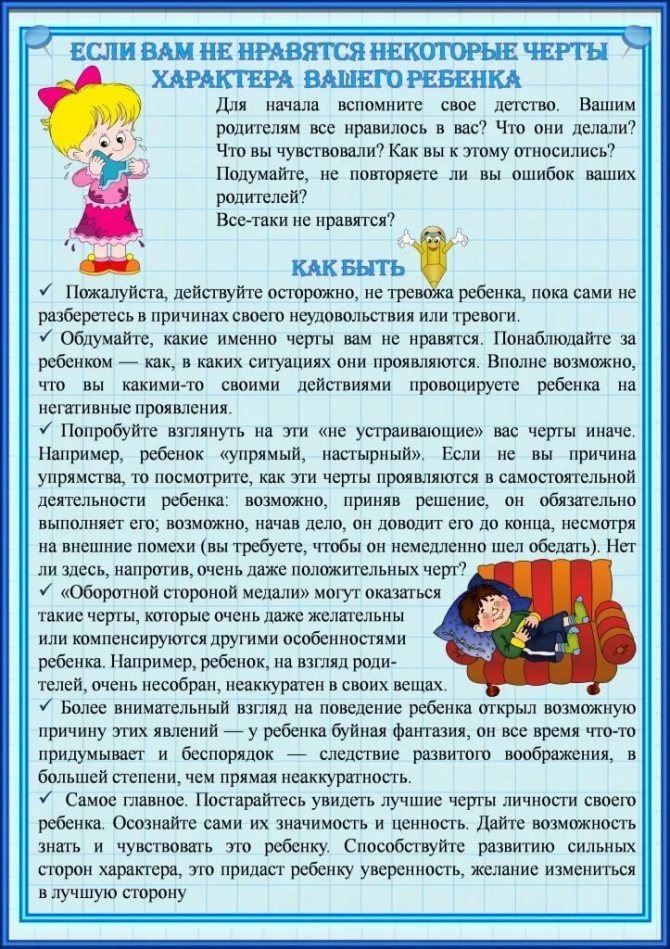
Parents' corner in the garden for the middle group in kindergarten
Legal information should also be present in the parent corner.
Parents' corner in the garden for the middle group in kindergarten
At this age, it is already necessary to teach children to sit, stand, and maintain their posture correctly. This information will be useful for both parents and children.
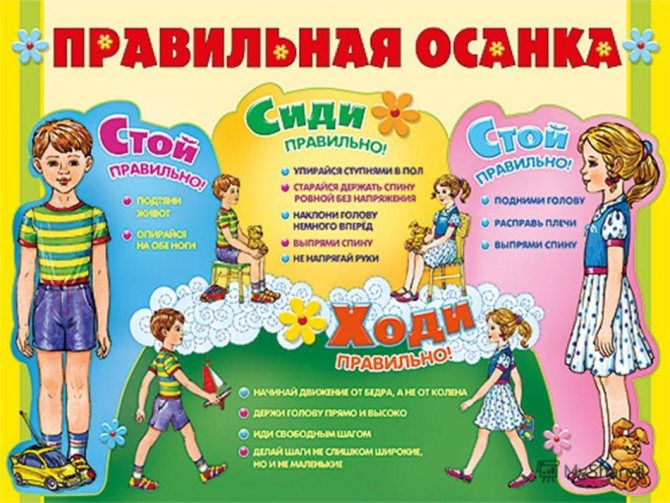
Parents' corner in the garden for the middle group in kindergarten
Explain to parents that stress often causes people to refuse to eat.
Parents' corner in the garden for the middle group in kindergarten
Consultations for parents - Consultation “Mom, play with me” for children 4–5 years old
Publication “Consultation “Mom, play with me” for children 4–5…” Buttons (game for children 3–5 years old) What you need: Buttons What to do: Mix several different sets of buttons and ask your child to sort them by shape and color. Develops attention and perception. Place buttons in piles (towers. Compete with your child - whose...
Methodological recommendations for developing the skill of composing descriptive texts in older preschoolers with speech impairment Taking into account the characteristics of children with general speech underdevelopment, in the process of implementing speech therapy work on developing the skill of composing descriptive texts in older preschoolers with speech impairments, one should adhere to the principles (see Fig. 2.5) : Rice. 2.5. Operating principles…
Recommendations for parents on teaching literacy to older preschoolers Teaching a child to read and write is a very important stage in his development. One of the most important tasks in learning to read and write is mastering the skills of analyzing and synthesizing words. Without the ability to combine sounds (letters) into syllables and words, to isolate sounds (letters) from a word, to determine their place and quantity in...
Consultation for parents “Pets” in the senior group Recommendations for parents lexical topic “Pets”. Senior group We recommend: - look at illustrations of domestic animals with your child, name them; - discuss the external signs of each pet, ask the child to answer questions like: “Why not...
Parents' Corner - kindergarten preparatory group
The preparatory group of the kindergarten is attended by future first-graders, and therefore the parent corner should have as much information as possible related to preparing for school. Below you will find ideas for filling such a stand.
Parents' Corner - kindergarten preparatory group:
Parents' corner - kindergarten preparatory group Parents' corner - kindergarten preparatory group
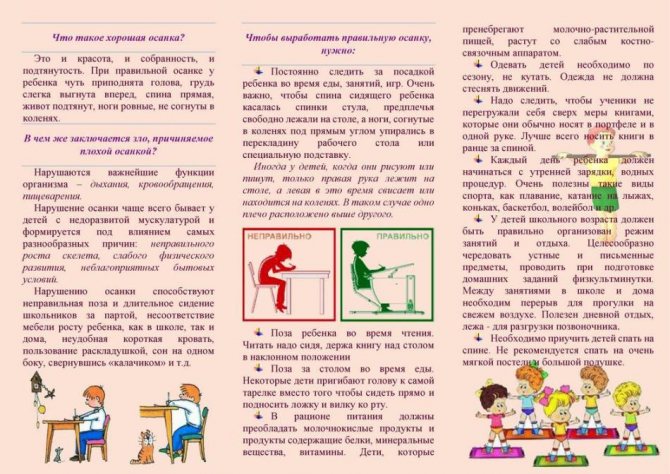
Parents' Corner - kindergarten preparatory group Parents' Corner - kindergarten preparatory group Parents' Corner - kindergarten preparatory group
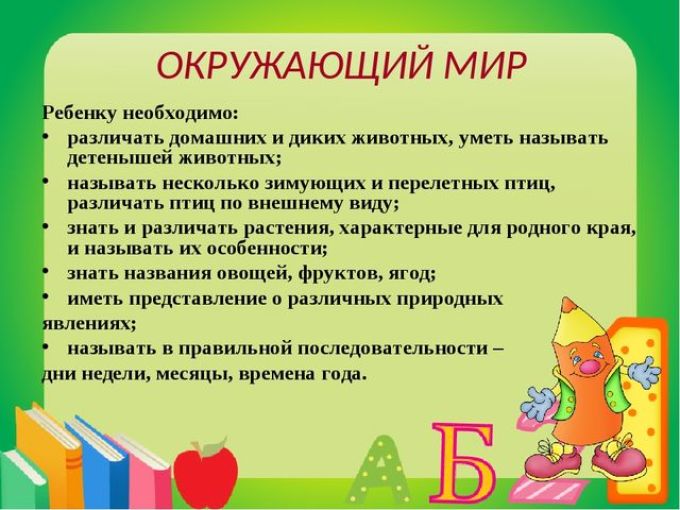
Parents' corner - kindergarten preparatory group Parents' corner - kindergarten preparatory group
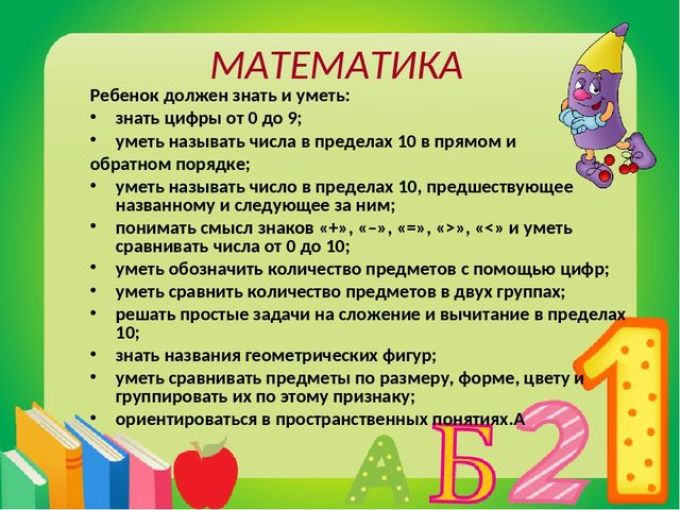
Parents' Corner - kindergarten preparatory group
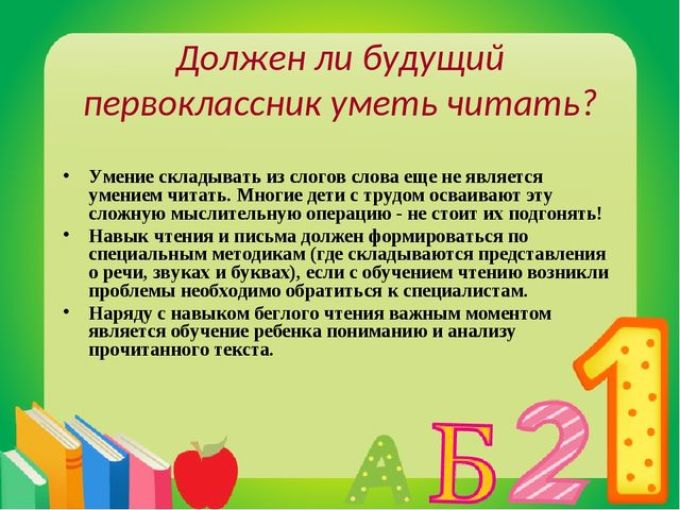
Parents' Corner - kindergarten preparatory group
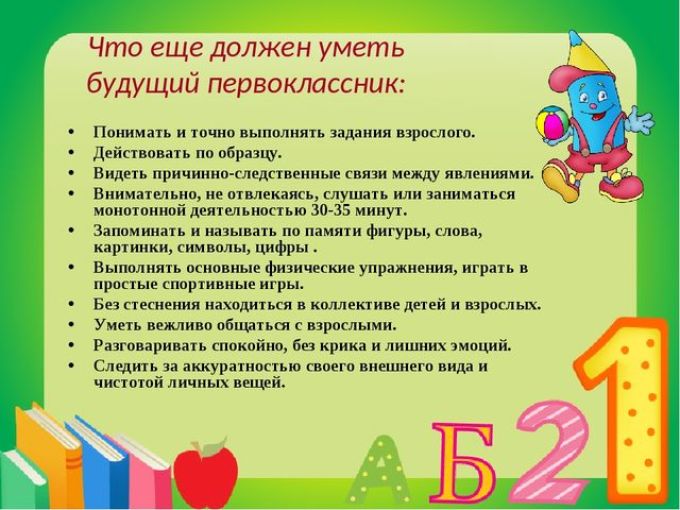
Parents' Corner - kindergarten preparatory group
Parents' corner in kindergarten - summer: design ideas
Parents' corner in kindergarten - summer, design ideas:
Parents' corner in kindergarten - summer, design ideas

Parents' corner in kindergarten - summer, design ideas

Parents' corner in kindergarten - summer, design ideas

Parents' corner in kindergarten - summer, design ideas Parents' corner in kindergarten - summer, design ideas Parents' corner in kindergarten - summer, design ideas
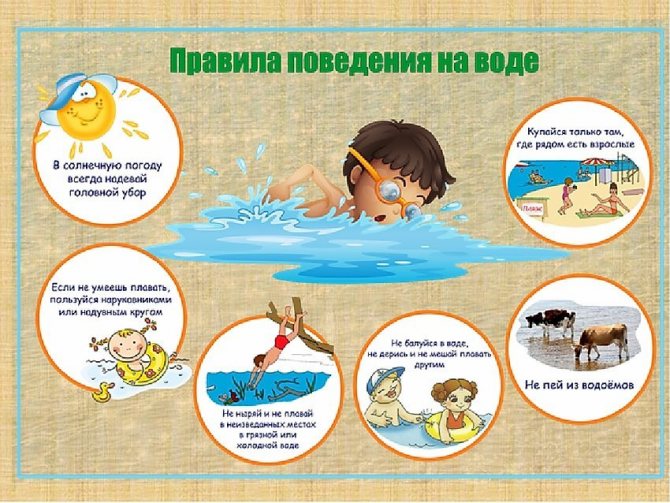
Parents' corner in kindergarten - summer, design ideas Parents' corner in kindergarten - summer, design ideas Parents' corner in kindergarten - summer, design ideas
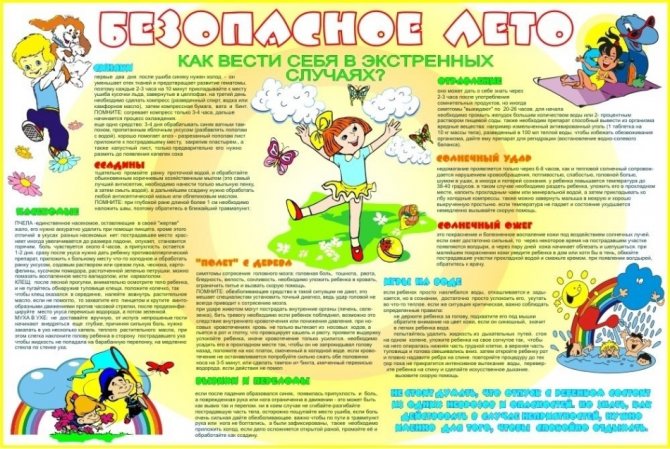
Parents' corner in kindergarten - summer, design ideas
Collection of consultations for parents of the preparatory group
Consultation for parents Topic: “How to teach a child to stand up for himself” Prepared by: preparatory group teacher Kucheryavenko S.A. This question worries moms, but dads probably care more. Life is cruel - men say, you have to fight your way through it, but we have a growing slobber. Moreover, those who are indignant about filial slobbering are, as a rule, those fathers who in childhood did not know how to stand up for themselves, and even in adulthood they are not painfully reminiscent of Rimbaud or James Bond. However, it is understandable. We all want our children not to repeat our mistakes and to be stronger and happier than us. Let's help them with this. You just need to do it correctly. Not all children successfully master self-defense lessons. Many people feel even more constrained because they cannot overcome their fear and, moreover, they are afraid of causing their dad’s displeasure. Therefore, they prefer not to complain to their father about their offenders, hide their feelings, stop trusting their parents, and become alienated from them. This gives rise to even greater problems, because, losing support from adults, the child feels completely defenseless. And if he is not naturally brave, fear of the world can become panicky. But there is another extreme. There are children who are almost accustomed to throwing their fists at offenders. It can be very difficult for them to get along in a team. They are quickly labeled as a bully and a vacuum is formed around him. They prefer not to contact him. Rejected children become embittered, and their desire for revenge gradually grows. And this generates a response and so on ad infinitum. By school, a child may develop a strong belief that there are only enemies around, and this is a direct path to depression. But what can we do? When thinking about this, it is important to separate two points: the attitude of the child himself to the situation and the attitude of the parents. And ask: are things so dramatic in the eyes of your son or daughter? Are they really being offended, humiliated, suppressed? Or is it some old grievances that have stirred up within you, and you unwittingly attribute your ideas about life to your children? Unfortunately, this is often the case. Why "Unfortunately?". Yes, because in this way an inferiority complex is formed in the child. If an adult had not focused his attention on some minor injustice committed against his child, he, perhaps, would not have noticed anything. Well, they pushed…., well, they teased…., well, they didn’t take them into the game, Who doesn’t it happen to? They didn’t accept me now, but in half an hour they will. Two minutes ago he was pushed, and two minutes later he will rush somewhere headlong and also accidentally push someone. Children's grievances are usually unstable and quickly disappear. But when adults focus their attention on the offense, it acquires a different status, as if receiving official recognition. But some parents don’t just focus their child’s attention on a trivial grievance, they try to sort things out in the presence of the child and other parents, and sometimes the conversation takes place in a raised voice. And the children hear everything... After all, adults often make a mountain out of a mountain, and thereby only harm the child, inflating his pride. And inflated, hypertrophied pride prevents the child from building normal relationships with others. He looks for a catch in everything, flares up like a match at any careless word spoken to him. But if a child turns out to be a victim everywhere he goes, then it’s not just a matter of the team. Most likely, there is something in himself that provokes offenders. After all, weak, but quiet, non-conflict children are usually not offended. Sustained aggression is provoked by “spiky” children. The kind that bully themselves and then run to complain. And they should be taught not so much to fight back as to get along with others: not to be offended, not to pretend to be a permanent leader, to treat the guys kindly, not to be sarcastic, not to tease. After all, adult life can indeed be cruel. This is not a kindergarten where you can get away with a couple of bruises……. Consultation for parents Topic: “Self-esteem. How to raise him? Prepared by: preparatory group teacher Kucheryavenko S.A. A high level of self-esteem is a very valuable character trait of a child. Self-confidence helps him cope with growing pains. Self-esteem is born from recognizing one's own merits.
If a child does something well, he feels satisfied. When he succeeds often, he develops faith in his abilities. The child wants to learn everything that other children and adults can do. He strives to comprehend new and more difficult types of activity.
A child who lacks self-confidence should be given the opportunity to demonstrate his abilities. Every child can do something well. The question is what exactly. Parents should think: “What comes easiest to a child?” Watch the child. See what he likes to do, what types of activities he prefers. Most likely, he will choose things that he succeeds in.
Adults should organize children's lives in such a way that they can confirm and develop their success. It is very important to maintain children's enthusiasm. Sometimes parents need to reconsider their views on which activities are suitable for boys and which for girls. A boy may prefer dancing, and a girl may prefer karate. The main thing is that parents show understanding. Children's interests often change, but the feeling that their parents understand them will remain for life.
There are other ways to build on children's success. Let the child do some simple tasks. A child can, for example, place plates on the table or sweep the kitchen after dinner. The child is very pleased when the drawing he has drawn is hung on the wall or refrigerator. It is important that the child successfully copes with new activities. Success in this case is determined not so much by the end result, but by the child’s desire to learn something new. Divide your child's assignment into a series of small tasks. When he completes the first, move on to the second, third, etc. Praise him as you go. Don’t rush your child and don’t rush to do something for him yourself. This will make him feel incompetent. The time and effort you spend will pay off handsomely - the child will respect himself. Spend as much time as possible with your child. He will understand that he is appreciated. He feels important when his parents put off various important “adult” things for him. Listen to your child's opinion. A girl will feel happy if her mother asks what dish to cook for lunch or what dress to wear when visiting. It's a wonderful experience for a child when adults take it seriously.
Praise is the basis for building self-esteem. This is recognition of the child's merits. The child needs to be praised. Specific praise is most helpful. It’s better to say to a child riding a bike, “You’re great for stopping at the corner,” than to simply state, “You’re great.” You will emphasize the desired behavior, and the child will understand how he should behave, and will not just be glad that he is just “well done” and will not know why. You need to teach your child to recognize his own achievements, otherwise he will remain dependent on the opinions of others. Make sure your child can evaluate his own skills. What can he do well? How he does it? If a child brings a drawing from kindergarten, let him tell you why he likes it. If he built a house out of cubes, ask how he managed to put them together.
The child should strive to assert his authority. Give him the opportunity to “educate” other children.
Consultation for parents Topic: “Children’s shyness” Prepared by: preparatory group teacher Kucheryavenko S.A.
Shyness is a characteristic common to many people, both children and adults. Probably, this trait can be called the most common cause of communication difficulties. Shyness can be a mental illness. As a rule, shyness, as a characteristic of behavior, begins to develop in preschool age. Over time, its manifestations become more stable and spread to the entire communicative sphere of a person.
To be shy means to be afraid of communication. A shy child perceives people around him (especially strangers) as posing a certain threat.
Today in psychology there is a widespread point of view that shyness is formed as a result of negative experiences that arise in a child in the process of communication and are gradually consolidated in the mind.
Shyness can be either selective or spread to the entire social environment of the child. Its occurrence may be associated with low self-esteem of the child. Considering himself worse, weaker, uglier than others, the child begins to avoid contact with others, subconsciously not wanting to injure his already damaged pride.
Helping a child overcome shyness and develop a desire to communicate is a completely doable task, but it needs to be solved by all adults who interact with a shy child - parents, educators, psychologists.
The sooner we begin to overcome shyness, the better. With age, a child develops a stereotype of shy behavior, it becomes fixed and difficult to correct. The child begins to be aware of his “shortcomings,” and this makes it very difficult to work with him, since the preschooler involuntarily fixes attention on his shyness and the characteristics of his character.
Some advice for parents whose children are shy.
· Expand your child’s social circle, invite your child’s friends over more often, take your child to visit friends, expand your walking route, teach your child to be calm about new, unfamiliar places.
· You shouldn’t constantly worry about your child, try to protect him completely. Give your child the opportunity to show independence and activity, give him a certain amount of freedom of action. Constantly strengthen your child's confidence in himself and his abilities.
· Involve your child in performing a variety of tasks related to communication. Encourage a shy child's contacts with “stranger adults”: ask him to buy bread or ask for a book at the library. At the same time, try to be close to the baby so that he feels confident and calm.
· Support your child, emphasize his successes in business, and also tell your child how many new and interesting things can be learned by communicating and playing with other children and adults. Consultation for parents Topic: “The character of your child depends on you” Prepared by: teacher of the preparatory group Kucheryavenko S. A.
We often say the word “character” and have become accustomed to it. “This is character,” we say with admiration. “What a character!” - we say when we are indignant. Is it good or bad to have character? Everyone, based on their own experience, understands character as a certain combination of a person’s individual characteristics. The main character traits are considered to be three groups of qualities that manifest themselves in relation to activity or any assignment (hard work, conscientiousness, perseverance, perseverance, independence); in a person’s attitude towards himself (pride, self-esteem) and towards others (caring, responsiveness, kindness, sensitivity). These qualities are equal in importance and are cultivated at the same time. You can instill in a child independence and self-esteem, but at the same time indifference. This combination of qualities is quite common. It also happens that a child is both sensitive and kind, but is unable to complete a single task and cannot set a goal for himself. Parents often object: “Not everything can be taught: character is inherited. There are two twin children in our family. We raise them the same way, but they grow up completely different. What can you do, we were born with different characters.” Is it so? Let's figure out how much a child's character depends on natural characteristics. What is innate in character and what is acquired?
Four properties of the child’s nervous system are congenital and hereditary. The first is the strength of the nervous system or performance: some children are hardy and capable of prolonged stress, others get tired quickly. This can be noticed in the game, when the child carries out an assignment. The second property is balance, or the balance of the processes of excitation and inhibition: in some children the process of excitation may predominate (noisy, restless children), in others the process of inhibition may predominate (calm children, who are almost impossible to get angry). Third feature -
mobility, switchability of nervous processes (one child easily and quickly moves from play to routine moments: upon waking up, he immediately joins the game). Another is characterized by being stuck on some experience, very slowly entering the state of wakefulness from sleep). The fourth feature is the dynamism of nervous processes, i.e. the ability to develop habitual forms of behavior and the speed of their change. Some children easily get used to new requirements in kindergarten and willingly obey them, while others, willingly following them, get used to them for a long time, with difficulty. The child's character is not predetermined by these natural characteristics of nervous activity. Observations of the development of twins confirm that the same conditions for their development cannot exist even in the same family; circumstances seem to force them to act differently. If a mother asks the children to help her, then one person responds first. Another child at this time may be standing with his back to his mother and therefore respond a few fractions of a second later. Several similar situations - and there is already a basis for the formation of opposite qualities (passivity and activity) in twin children. Various combinations of properties make it possible to identify unequal individual characteristics in the child’s behavior and activities. Peculiarities of nervous activity can both complicate and help cultivate certain character traits. Thus, it is more difficult to develop self-control in a very sensitive child than in a balanced child. It is more difficult to cultivate perseverance in excitable children than in slow children. Remember that all children, regardless of their individual psychological developmental characteristics, need the targeted influence of an adult who consciously uses various methods and techniques to form certain character traits of the child. All preschoolers are taught stable moral feelings, moral motives for behavior, obedience and
curiosity, activity. However, in raising children with different individual characteristics, it is important to rely on the positive characteristics of higher nervous activity, while changing their undesirable manifestations. Thus, in active, balanced children, special attention is paid to the development of stable interests and stable moral motives of behavior. If this task of upbringing is solved correctly, then the child will have patience, perseverance, which was not there before, and the ability to complete the work he has begun, even if he is not interested in it. Education of moral feelings will allow the child to consciously comply with the rules and requirements of adults, and will prevent the development of such qualities as frivolity and self-confidence. In raising children of a different type - excitable, unbalanced - parents prevent their temper, cultivate self-control, perseverance, the ability to correctly assess their strengths, think through decisions and stages of their activities. Adults must be both demanding and patient. Demanding obedience from children and preventing temper and stubbornness, the child is explained the validity of this or that requirement and the need to follow the rules. Adults do not persuade, but explain, remaining demanding. If a child is given an order, he says it out loud, explaining what he will do, what he needs for this, what parts of the beams to divide the order into to make it easier to complete, what difficulties may be encountered and how to avoid them. Don't forget to approach him sometimes - the child may need your help. You should not be afraid to trust your child, but you should also provide him with the necessary help. A preschooler can be assigned to set the table when guests arrive; You can ask to go to your neighbors with any request. Such assignments require from the child external and internal composure, restraint, politeness, that is, those qualities that he and
lacks; adults highly value these very qualities demonstrated by an unbalanced child, so that they become stable character traits.
In raising slow children, special attention is paid to developing their activity, initiative, and curiosity. Slow children develop the ability to quickly switch from one task to another. Such children especially often take walks to the park, forest, go to the zoo, or the circus. The imagination of slow children is constantly awakened by including them in all events of family life. This helps create the habit of always being busy and active. If the child does everything very slowly, it is important to be patient and not get irritated. It is useful to do something in a race with him, trying to give him a limited time to complete the assignment. In this case, you can count down the time (for example, when getting dressed), or remind the child that you were going to read a book to him or watch a cartoon, but because of his slowness, you may not have time to do this. Children develop accuracy, dexterity, and speed of movement. Slow children are often played with active games that require these qualities. When raising sensitive, vulnerable children, they strictly adhere to the daily routine, give the child only feasible tasks and help him on time. Addresses to a child are distinguished by special sensitivity, gentleness, an even, friendly tone, and trust in his strengths and capabilities. If something is entrusted, then you should remember that he needs time to prepare the workplace, and that the assignment will be carried out very carefully. Therefore, you should not be annoyed if your child pays attention to little things. Vulnerable children are taught self-confidence, initiative, independence, and sociability. In front of strangers, you should not pay attention to the child’s manifestations of shyness or improper actions. In upbringing, strict punishments or threats of punishment are not used in response to the child’s insecurity or incorrect actions.
You cannot intimidate sensitive children - they are already characterized by timidity and fear of new things. It is necessary to teach them to overcome feelings of fear. If a child is afraid of the dark, you need to enter the dark room with him and turn on the light. Then the child will do it alone, and the adult will be somewhere nearby. When cultivating courage, you need to teach your child to overcome his fear. If he is afraid of a caterpillar crawling on the ground, take it in your hands, let him touch it in your hands, let him take it in his own. Approve his action: “You did well, you weren’t afraid, you’re brave.” You will see the joy of a little person who has overcome his fear, his uncertainty. For this uncertainty to disappear completely, he must feel that you will treat him with understanding and sensitivity even if he does something wrong; that you will not scold him and say: “It’s always like this with you.” If you treat a vulnerable child and his failures kindly, then over time, thanks to the patience and goodwill of an adult, his anticipatory high assessment of the child’s courage and independence, the preschooler gains confidence in his abilities, he becomes sociable and trusting.
Consultation for parents Topic: “How does a preschooler become a schoolchild?” Prepared by: preparatory group teacher Kucheryavenko S.A.
It would seem that the answer to this question can be simple: he goes to school. But this is an illusion of simplicity. There are children who, while studying in first and even second and third grade, remain preschoolers. And there are those who, upon entering school, lose the features of a preschooler, but never truly turn into schoolchildren. The difference between a preschooler and a schoolchild is not external, but internal, psychological. And it is determined by how the child relates to other people - adults, peers, to the tasks he performs, and by how developed his mental qualities are necessary for the systematic acquisition of knowledge.
To begin with, let's try to sketch a psychological portrait of a junior schoolchild, and not just a schoolchild, but, so to speak, an ideal schoolchild, that is, a child who loves to go to school, studies successfully and, most importantly, under the influence of education, successfully advances in his mental development. And the first thing that interests us is the child’s attitude to school, learning, teacher, peers, that is, the so-called “student position”, as defined by the famous psychologist L.I. Bozhovich. School is a special place where they teach and learn, that is, they do important, necessary and honorable work. Learning is not the same as playing. You learn something new all the time, you get older and smarter. And everyone understands that your studies are like dad’s work, you need to take it seriously. Therefore, when you are given a lesson, you have the right to ask to turn off the radio or TV so that you are not interrupted in your work. And it’s good when the lessons are given more difficult - you feel better that you are taken seriously. The teacher is the most knowledgeable, most respected person. What he says is always correct and binding on everyone. He is fair and loves all children equally. It gives marks for what you know and how hard you try. It's very nice to get A's, but if you don't always succeed, it means you have to try harder and in the end you will definitely succeed. The best children in the class are those who follow school rules, study diligently and help their friends...
You feel that a certain standard of a “student” has begun to emerge, for which teachers and parents can only pray... Nothing can be done, this is the position of a schoolchild in its “pure” form. And in fact, many younger schoolchildren quite clearly adhere to it, often surprising their parents with their pedantry in observing school regulations. But let's go further in drawing up the planned portrait.
What else should be included in the psychological portrait of an imaginary excellent student? Of course, he pays full attention in class. He doesn’t fidget, doesn’t chat with his neighbor at his desk, and in any case doesn’t jump up from his seat and go for a walk around the class. He doesn’t have a favorite bunny or a small car in his desk that he can slowly roll back and forth from time to time. After all, firstly, what could be more important for him than the teacher’s story, and secondly, he has already learned to control himself, be attentive, and not be distracted, even if something unusual happens nearby (for example, a neighbor climbs under his desk to look for rolled away handle). This is arbitrary behavior. It affects everything - in the concentration of attention, in the ability to follow the course of reasoning of the teacher and other children, to follow instructions in a timely manner, to act in accordance with the rules, and to purposefully memorize what is given. But randomness alone is not enough. After all, you need not only to listen, but also to understand what the teacher is saying, not only to carefully read the textbook, but also to imagine what is written in it, not only to remember the rules, but also to figure out how they can be applied in this or that case. This means that one cannot do without developed perception, thinking, and imagination, which ensure the conscious assimilation and application of school knowledge. They also need to be included in the portrait, especially emphasizing logical thinking - the ability to compare facts, reason consistently, and draw conclusions. Perhaps this could have ended there if the child could survive only on consciousness and volition. In practice, this is impossible, and interest in the educational material itself comes to the rescue - in how people lived in the old days, how they live in different countries, in the animal world, in the causes that give rise to natural phenomena, and in the secrets of mathematical calculations.
Now let’s turn to a typical preschooler and see to what extent he meets the requirements for an “ideal” student. The position of a preschooler is based on a completely different attitude towards the people around him and his own activities than the position of a schoolchild. Mom and dad love you, forgive you for your pranks and whims, and in any case they will not scold you if you accidentally break a cup. Of course, it happens that they get angry and even punish because they are offended by you, but all this is easy to fix: you only have to, even if you have seriously misbehaved, say: “I won’t do it again” in order to be forgiven. Of course, it’s good for them, adults: they can do everything, but for some reason a lot of things are forbidden to you. Kindergarten is a place where they play. Classes are also a game: Petrushka comes and asks to help him count how many cups are needed to give tea to all the dolls. And if you didn’t understand something or did something wrong, you will still be praised - after all, you tried. Elena Petrovna, the teacher, is like a mother, only it’s more difficult for her: there are many children, and she is alone. You can't keep track of everyone. Therefore, she needs to sympathize, obey, and not make too much noise. At the same time, it is quite possible that life has many wonderful surprises in store for these children, and therefore it would be unfair to condemn them to a boring, limited existence, while very little effort on the part of parents, simple special classes, an unexpected approach to this or that in another matter, they can make the child a multifaceted personality, which in the future will open all possible doors for him.
Consultation for parents Topic: “Mistakes that should not be made” Prepared by: teacher of the preparatory group Kucheryavenko S.A.
For you, parents! Mistakes you shouldn't make.
All parents raise their children based on their life experience and understanding of life. Each of us dreams that he will be the best, the smartest and the kindest in his relationship with his child. And it often works out. But there are times when the child’s behavior is perplexing and annoying; and we do something that makes us feel ashamed, uncomfortable, and you begin to scold yourself and swear to yourself that this will not happen in the future. So what mistakes do we make? The first mistake is indifference “Do what you want, I don’t care.” Parents’ opinion:
When I was little, they didn't baby me.
The child must learn to solve his own problems. And in general, the child must be prepared for adult life, let him quickly become independent. Psychologists' opinion
: The child, feeling your indifference, will immediately begin to check how “real” it is.
The test may involve committing misconduct. The child waits to see whether such an act will be followed by criticism or not. It turns out that both of you. Therefore, it is better, instead of ostentatious indifference, to try to establish friendly relations with your child, even if his behavior does not suit you at all. Mistake two - too much severity “You must do what I told you. I am a mother, I am the main one in the house” Parents’ opinion:
Children should always obey their parents - this is the most important principle in education.
Alternatives are not allowed here. It doesn’t matter how old the child is, whether he is a high school student or a preschooler. Children should not be given any concessions, otherwise they will finally sit on our necks. Opinion of psychologists:
Children must understand why and why they do something.
Too strict upbringing, based on principles that are not always clear to the child, resembles training. A child can unquestioningly do everything when you are around, and ignore all prohibitions when you are not around. Conviction is better than strictness. If necessary, you can say this: “Now you do as I say, and in the evening we will calmly discuss everything - why and why.” Mistake three: children need to be pampered “I guess I’ll do it myself. My baby can’t handle this yet.” Parents’ opinion:
We are ready to do anything for our baby, because children should always receive the best.
Childhood is so fleeting, so it should be wonderful. It’s so nice to guess and fulfill any child’s wish. Opinion of psychologists:
Spoiled children have a very hard time in life.
Excessive care and attention can lead to problems in the future. When parents literally predict every movement, every breath, this does not make the child feel happier. Rather, on the contrary, he feels completely helpless and alone. “Try to do it yourself, and if it doesn’t work out, I’ll be happy to help you,” is one of the options for a wise attitude towards your daughter or son. Mistake four - imposed role “My child is my best friend” Parents’ opinion:
A child is the most important thing in our life, he is so smart, you can talk about everything with him.
He understands us, just like a real adult. Opinion of psychologists
Adult problems should not fall on the shoulders of children.
It is unacceptable to drag them into conflicts and interpersonal relationships between adults. Children are designed in such a way that they are interested in everything. Of course, they will listen to you as much as you want. Most likely, they will take your side. Kids are ready to immerse themselves in the complex world of adult problems, instead of discussing their interests with their peers. But at the same time, their own problems remain unresolved. The fifth mistake is monetary “More money means better education” Parents’ opinion:
We have a small salary.
There are not enough funds to pamper a child. If we had more money, we would give the child everything and make him happier. Opinion of psychologists:
Money can’t buy love - it sounds quite banal, but it’s true.
It often happens that in families with low incomes, adults do everything so that the child does not need anything. They literally pull themselves together so that their child’s life is no worse than that of others. But such parents should not feel remorse for not being able to fulfill all the wishes of their child. In fact, attention, affection, joint games and communication are much more important than the contents of the wallet. And, if you look at it, it’s not money that makes a child happy, but the realization that he is the BEST for his parents. Error six - Napoleonic plans “My child will study music (tennis, figure skating). He shouldn’t miss his chance.” Parents’ opinion:
Many adults dreamed of doing ballet, learning to play the piano or playing tennis as children, but they did not have such an opportunity.
And now the main goal of fathers and mothers is to give their children the best education. It doesn’t matter if the kids don’t really want this, time will pass and they will appreciate the efforts of adults. Psychologists' opinion:
Unfortunately, children do not always appreciate the efforts of their parents.
Parents themselves provoke this behavior in their children. After all, often the brilliant future drawn by adults in their imaginations is just the ambitions of mom or dad, but not the true desire of the child. While the baby is still small, he obeys adults. Growing up, he wants to break free from parental love, and begins to express protest in ways available to him - this could be taking drugs, or simply being interested in heavy rock music at night. A situation of misunderstanding, alienation, and resentment on the part of adults arises. Therefore, before you decide something for your child, listen to his interests. Observe his behavior and mood, try to understand whether he likes what he does. Do not turn your child’s life into satisfying your own ambitions. Mistake seven - too little affection “Kisses, hugs and other tenderness are not so important for a child” Parents’ opinion:
Many adults believe that affection (kisses with mom, hugs with dad) in childhood can lead to sexual problems in the future orientation.
In short, no hugs and kisses. There are more necessary and serious things. Psychologists' opinion:
Children of any age strive for affection, it helps them feel loved and gives them confidence in their abilities. There is an opinion that a child should receive at least 10 touches (patting the head, hugs, kisses) throughout the day to feel good and have a good mood. Otherwise, the child may experience emotional hunger and think. That they don't like him.
Mistake eight - your mood: “Is it possible or not? It depends on your mood.” Parents’ opinion:
Troubles at work, bad family relationships,...
How often do adults “let off steam” on a child! Many are sure that there is nothing wrong with this. Then it’s enough to pretend that nothing happened or buy a long-promised toy, and everything will be fine. Psychologists' opinion:
Parents should show their child that they are pleased by his good deeds and upset by his bad ones.
This creates in children a consciousness of the unshakability of life values. When adults, to please their selfishness and mood, allow something today and forbid it tomorrow, the child can understand only one thing: it doesn’t matter what I do, the main thing is what mom’s mood is. However, if you feel that you cannot change yourself, it is better to agree with your child in advance: “So, when I am in a good mood, you will be allowed to do whatever you want. And if it’s bad, try to be lenient with me.” Mistake nine - too little time to raise a child “Unfortunately, I don’t have any time for you” Parents’ opinion:
Many adults are very busy at work, but they try to spend every free minute with their children: they take them to kindergarten and school, cook for them, wash, buy everything they need.
Children themselves must understand that their parents simply do not have time to play and read with them. Opinion of psychologists:
Adults often forget a simple truth - if you have already given birth to a child, you must find time for him. A child who constantly hears that adults do not have time for him will look for kindred spirits among strangers. Even if your day is scheduled minute by minute, find half an hour in the evening (in this matter quality is more important than quantity) to sit by your baby’s crib, talk to him, tell him a story or read a book. The baby needs this.
Good luck to all!!!
